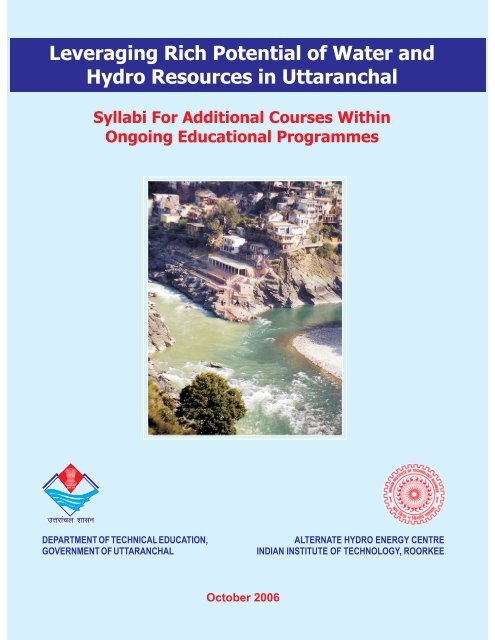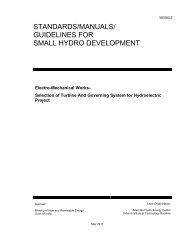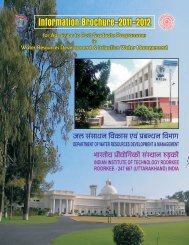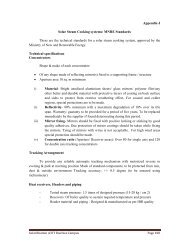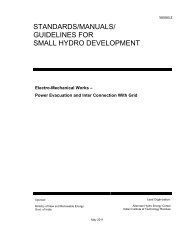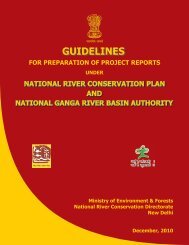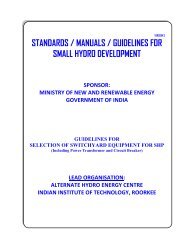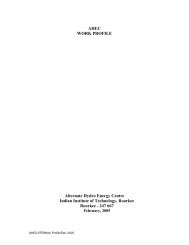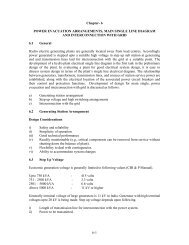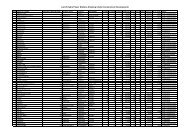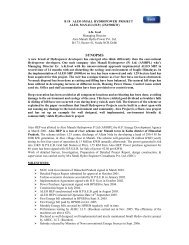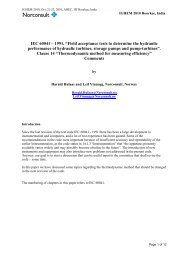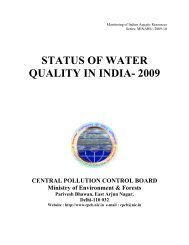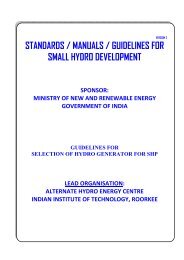AHEC Final Cover.cdr - IIT Roorkee
AHEC Final Cover.cdr - IIT Roorkee
AHEC Final Cover.cdr - IIT Roorkee
You also want an ePaper? Increase the reach of your titles
YUMPU automatically turns print PDFs into web optimized ePapers that Google loves.
mÙkjkapy “kkluOctober 2006
Leveraging Rich Potential of Water andHydro Resources in UttaranchalSyllabi for Additional Courses withinOngoing Educational ProgrammesmÙkjkapy 'kkluDEPARTMENT OF TECHNICAL EDUCATION,GOVERNMENT OF UTTARANCHALALTERNATE HYDRO ENERGY CENTREINDIAN INSTITUTE OF TECHNOLOGY, ROORKEEOctober, 2006
<strong>IIT</strong> <strong>Roorkee</strong> Team Involved in Preparing the Syllabi Development DocumentProf. H. Sinvhal, Earth Science Deptt.Prof. V.K. Nangia, Management Studies Deptt.Prof. A.K. Pant, Electrical Engg. Deptt.Arun Kumar, Head <strong>AHEC</strong>, Principal Investigatorin association with subject experts individuals, faculty from different departments of <strong>IIT</strong>,<strong>Roorkee</strong>, Universities, colleges, polytechnics, ITIs, State Government Departments andorganisations, private power developers and others involved in water resources andhydropower development in the State of Uttaranchal.
PREFACEWater Resources and Hydropower development are highly specialized fields andneed technically trained manpower with diverse backgrounds. Such manpower is in greatdemand throughout the nation and not easy to find. Institutions involved in technicaleducation at different levels also do not specifically run full programmes or provideadequate training in these areas.Uttaranchal is a hilly state with vast potential for development of hydropower.The state government is committed to develop the state as a major water resources/hydro-power-hub of the nation. The government of Uttaranchal requested AlternateHydro Energy Centre, <strong>IIT</strong> <strong>Roorkee</strong> to develop syllabi for courses at different level byvarious educational institutions in the state with the objective of developing technicalmanpower in this field and to enhance the employability of the youth of the state in thewater and power sector.Alternate Hydro Energy Centre, <strong>IIT</strong> <strong>Roorkee</strong> organised a series of meetings withthe different stake holders, viz., the hydro-power developers, contractors, otheremployers in the private, public and government sectors, educationists, professional andpracticing engineers in the power sector, to understand their needs and to discussvarious aspects of the curriculum development. The deliberations at these meetings madeit clear that starting totally new courses/ programmes in this area was not feasible onmany accounts but introduction of core and elective subjects in the already existingcourses at different levels was highly desirable and easily acceptable. It was felt that thiswill not only be the cost effective and practical but will also help the youth to becomebetter equipped to be employed for various jobs in the water resources and hydro powerareas both in government and private sector within and outside the state.In the meetings with the subject experts and teachers in various aspects ofhydropower generation, selected experts and teachers were invited to develop syllabi forvarious courses and suggest when, where and at what level they should be offered. Thesyllabi so developed were reviewed and deliberated <strong>IIT</strong> <strong>Roorkee</strong> Team by the experts andare being published with the hope that they will be made a part of the existingprogrammes being offered to students at different levels not only in the State ofUttaranchal but also in other states with similar needs.As courses and syllabi development is a continuous process suggestions forimprovement are welcome.- The Team
CONTENTSEXECUTIVE SUMMARYPage Nos1 Background 12 Assignment 23 Introduction 34 Need for Enhancing Employability in Water Resources / Hydro 4Power Sector for the People of Uttaranchal5 Approach and Methodology 56 Subjects to be Introduced 87 Recommendations 117.1 Identified and Designed Courses12Engineering Degree Level Courses7.2 Engineering Diploma Level Courses 137.3 Master Level Degree in Arts, Science, Commerce and13Management7.4 Special Short Term Training Programmes 147.5 Trades at Industrial Training Institutes 147.6 Identified and Recommended Institutions 157.7 Financial Implications 157.8 Funds requirement for institutions offering new courses 16TABLESTable 1 Cost estimates for Preparation of Manuals andOrganizing Training of TeachersTable 2 Cost Estimates for Strengthening the Institutions atDegree Level in EngineeringTable 3 Cost Estimates for Strengthening the Institutions atMasters Degree Level in Arts, Science, Commerce andManagementTable 4 Cost Estimates for Strengthening the Institutions atDiploma Level in PolytechnicsTable 5 Cost Estimates for Strengthening the Institutions at ITILevelTable 6 Summary of Budgetary Estimates for Strengthening theInstitutions at All Levels171718191920<strong>AHEC</strong>-<strong>IIT</strong>R/Ua. Govt./syllabus/WR-HPD/2006
(A)(B)APPENDICESSYLLABI FOR VARIOUS COURSESSUMMARY OF DISCUSSIONS HELD IN WORKSHOPSAppendix 1Appendix 2Appendix 3Appendix 4Water Resources Development (for the branches in Civil,Electrical, Mechanical, Industrial, Agriculture, Environmental,Production Engineering)Hydropower Engineering (for Branches Civil, AgricultureEngineering)Hydropower Development (for Branches in Electrical,Mechanical, Instrumentation, Electronics Engineering)Automation in Water Resources and Hydropower Plant (forElectronics, Electrical Engineering)23252729FOR ENGINEERING DIPLOMA LEVEL COURSESAppendix 5 Water Resources Development (for the branches in Civil,31Electrical, Mechanical, Industrial, Agriculture, Environmental,Production, Electrical Engineering)Appendix 6 Environmental Science (for all branches) 34Appendix 7 Hydropower Development Engineering (for the branches in 36Civil, Agriculture Engineering)Appendix 8 Hydro Power Engineering (for the branches in Electrical,38Instrumentation, Electronics Engineering)Appendix 9 Hydro Power Plants (for the branches in Mechanical, ChemicalEngineering)41FOR MASTER LEVEL COURSESAppendix 10Appendix 11Management Concept And Practices (for all Master LevelCourses except Management and Commerce)Environmental Impact Assessment (for all Master LevelCourses)4446SHORT TERM TRAINING COURSESAppendix 12 Six weeks Short Term Programme in Water Resources/Hydro 48Power Development (for Engineering Degree and DiplomaPassed out Students)Appendix 13 Educational Institutions in Uttaranchal 49PROCEEDINGS OF THE WORKSHOPSAppendix 14 Summary of Discussions held on April 30, 2005 62Appendix 15 Summary of Discussions held on June 22, 2005 65Appendix 16 Summary of Discussions held on June 28, 2005 70Appendix 17 Summary of Discussions held on Sept. 30, 2005 73<strong>AHEC</strong>-<strong>IIT</strong>R/Ua. Govt./syllabus/WR-HPD/2006
EXECUTIVE SUMMARYGovernment of Utttaranchal gave an assignment to Alternate Hydro EnergyCentre (<strong>AHEC</strong>), Indian Institute of Technology <strong>Roorkee</strong> (<strong>IIT</strong>R) to prepare Syllabi for“Leveraging Rich Potential of Water and Hydro Resources in Uttaranchal” to increaseemployment opportunities in Uttaranchal.Four workshops were organized by <strong>AHEC</strong> to discuss and collect views of all thestake-holders. Detailed syllabi for 12 courses have been prepared. It is recommendedthat the following activities should be undertaken to achieve the desired objectives:(a)(b)(c)(d)(e)Introduction of new subjects in existing course in the areas relevant toHydro Power Development and Water Resources Management at differentlevels.Organisation of training of teachers who could teach these courses and toprepare teaching manuals for them,Strengthening of existing laboratories and libraries in select institutionsVisit of students and teachers to water resource management schemes andhydro power projects, participation in conferences and visit ofprofessionals to deliver special lectures in select institutions who willinitiate running these courses andOrganisation of short term courses for already passed out studentsPreparation of manuals and conducting training programmes for teachers willinvolve an expenditure of Rs. 31.00 lacs. It is proposed that new courses should beintroduced initially in 2 Engineering Degree Colleges, 5 Postgraduate Institutions, 7Polytechnics and 5 ITIs and these institutions should undertake activities listed abovewith initial expenditure of Rs. 21.00 lacs and annual recurring expenditure of Rs. 30.55lacs.<strong>AHEC</strong>-<strong>IIT</strong>R/Ua. Govt./syllabus/WR-HPD/2006
BACKGROUND:Government of Uttaranchal in December 2004 decided to address the HumanResources Development and related employment issues specially amongst the youth ofthe state by leveraging the water resources / hydropower development potential availablein the state. The issues needing attention included:• How to produce engineers, designers, environmentalists, social scientists andtechnicians of quality with knowledge of subjects related to hydropower?• How to create and strengthen expertise in Environment Impact Assessment?• How to create and strengthen skills in execution, operation and maintenance ofthe water resources / hydropower projects?These issues can be addressed through a constant process of dialogue amongstvarious groups such as power entities, project organizations, academic institutions likeUniversities, Engineering Colleges, Polytechnics, Industrial Training Institutes (ITIs),Vocational Training Schools, other schools and colleges to access the needs of theindustry and educational institutions and aspirations of the students. A need was felt forrevision of syllabi and introduction of new subjects in the existing curricula of the state’stechnical institutions and colleges to meet the requirements of the user organizations inthe area of water resources and hydropower development.It was realized that specialized education being imparted in the state throughcolleges, vocational schools, ITIs, Polytechnics and Engg Degree colleges should bereoriented / strengthened by introducing education / training in the field of waterresources and hydropower through introduction ofa) special subjects as mandatory and elective courses,b) special courses during vacation,c) training in specific trades andd) apprenticeship in specific trades.<strong>AHEC</strong>-<strong>IIT</strong>R/Ua. Govt./syllabus/WR-HPD/20061
A meeting chaired by Development Commissioner, Government of Uttaranchalwas held at Secretariat, Dehradun on January 18, 2005. The meeting was attended bySecretaries of the Departments of Finance, Energy, Planning and Technical Education ofGovernment of Uttaranchal and representatives from <strong>IIT</strong> <strong>Roorkee</strong>. In the meeting it wasdecided that the proposal of Alternate Hydro Energy Centre (<strong>AHEC</strong>), <strong>IIT</strong> <strong>Roorkee</strong> for“Reviewing the Syllabus/Courses and DesigningNew Courses in the Area of Water Resources Management and HydropowerDevelopment” be accepted and that this activity should be supported by TechnicalEducation Department of the State Government.2. ASSIGNMENT:Uttaranchal Technical Education Board, Govt. of Uttaranchal vide its letter no.80/UBTE/Account/2005-06 dated April 8, 2005 requested Alternate Hydro EnergyCentre (<strong>AHEC</strong>), Indian Institute of Technology <strong>Roorkee</strong> (<strong>IIT</strong>R) to take up theassignment.Under the assignment following objectives were to be achieved:1. To access the need of various stake holders working in the area of waterresources/hydropower development in the state of Uttaranchal by holdingconsultative meetings/workshops with the stake holders viz., differentdepartments/organizations/ corporations of state and central government,educational institutions, independent power producers, NGOs and the industry.2. To review the existing syllabi with a view to enhancing the employability of theyouth coming out of different educational institutions in the areas of waterresources/hydropower development.3. To identify the courses which could be introduced at different levels in theexisting teaching schemes.4. To design the courses and syllabi for introducing such courses at different levels.<strong>AHEC</strong>-<strong>IIT</strong>R/Ua. Govt./syllabus/WR-HPD/20062
5. To assess the requirement of human resources development and financial inputsrequired for introducing these courses including strengthening of the existinginfrastructure and skill upgradation of existing manpower.6. To recommend the action plan for introducing the subjects and providing thenecessary budgetary support from the government to the educational institutions.<strong>AHEC</strong>, <strong>IIT</strong> <strong>Roorkee</strong> formed a multidisciplinary team comprising of senior facultyfrom science, technology and management departments, faculty of other institutions andsubject experts drawn from different fields for undertaking the assignment. The emphasisin the assignment was initially for Technical Education, however, other streams were alsoincluded as education is a holistic subject and the state needs professionally trainedmanpower in all disciplines and at different levels.3. INTRODUCTION:Uttaranchal, the newly formed 27 th state of the Republic of India is endowed withthe largest and highest natural dam in the word, the Himalaya. Every year a large amountof water is transported from the oceans as cloud, precipitates and gets deposited (in theform of snow) in the Himalaya. The snow then melts and feeds our rivers. This makesUttaranchal an ideal state to harness the potential of water resources for generating hydropower for the energy hungry nation and provide regulated and regular supply of water forthe nation.It is now well recognized that availability of power is an essential requirement fordevelopment of a nation. With the fast depleting fossil fuels, the need to increase andshift dependence on hydro power generation for the prosperity of the nation can not beover emphasized. It is well known that as a state, Uttaranchal has not utilized even onetenth of its potential for generating hydro power. However, it is heartening to note thatthe government has recognized the need of the hour and the challenge has been taken upto convert Uttaranchal as a leading power generating state of India. A large number ofhydro power schemes are under different stages of planning/execution and many more<strong>AHEC</strong>-<strong>IIT</strong>R/Ua. Govt./syllabus/WR-HPD/20063
are envisaged in the future. The power generation capacity in the state is expected toreach a level of 5500 Megawatts by the year 2015 from the present level of 1100Megawatts to make the state a major hydropower producer for the nation.Unlike thermal power station projects, where the basic design more or lessremains unchanged for a certain plant capacity, each hydro power generation scheme isunique. It calls for large scale and time consuming investigations followed by detailedsite specific designs. Planning and construction of dams and other associated structuresis complicated, requiring imagination and ingenuity combined with scientific andtechnical knowledge and skills. It requires a large number of professionally trainedpeople at different levels as well as in different disciplines (primarily civil, mechanicaland electrical engineering) working as a team. The gestation period of a hydropowergeneration project is large as compared to thermal power project and it needs much moremanpower to build. However, once completed the hydropower generation is not onlycleaner and environment friendly but also cheaper. Furthermore, compared to thermalpower projects hydropower projects have a much longer life. This makes hydropowergeneration an ideal choice for the future. In addition to generating power, the dams alsostore water for human and agricultural use and thus help in water resources management.4. NEED FOR ENHANCING EMPLOYABILITY IN WATER RESOURCES/HYDRO POWER SECTOR FOR THE PEOPLE OF UTTARANCHAL:Uttaranchal is largely a hill state. Eleven out of thirteen districts in the state arehill districts. Mountainous topography makes agriculture difficult. Traditionally a largenumber of young people migrated to the plains looking for employment or tried to jointhe armed forces. This is the reason why the local economy was known as ‘Money-Ordereconomy’, an economy in which the money for sustenance of the people living in hillscame from their relatives who had migrated from the region to other regions whichoffered more avenues of employment. This was also the reason for the region havingremained under developed despite high literacy rate.<strong>AHEC</strong>-<strong>IIT</strong>R/Ua. Govt./syllabus/WR-HPD/20064
Realizing the rich potential of water and hydro power generation in Uttaranchal,the government is alive to the need to make available technically trained manpower tomeet the challenges of water resources management in the state. Development of Hydropower generation schemes in the state offers new opportunities for the local youth to besuitably employed as well as contribute to the development of the region. If the statefails to provide technically trained local youth for meeting the needs of the hydro sectorthen we shall see a large scale migration of technically trained people from other regionsmigrating to Uttaranchal to meet the demand. This may lead to social and economicdisparities and aggravate other related problems. Our country is free and inter regionalmigration can neither be stopped nor are restrictions desirable. The ideal way to tacklethe problem is to make available suitable manpower locally. With this aim it has beendecided to impart relevant education and equip the local youth with skills that providethem an edge over their counterparts seeking employment in the state in a free and fairmanner, specially in the hydro power development and water resources managementsector.5. APPROACH AND METHODOLOGY:In order to understand the perceptions, vision, needs and aspirations of variousstake holders four workshops were organized by <strong>AHEC</strong>, <strong>IIT</strong> <strong>Roorkee</strong>.5.1 The first workshop held on April 30, 2005 at Dehradun, was attended byrepresentatives from various state and central government departments/corporations, independent power producers, and representatives from <strong>IIT</strong><strong>Roorkee</strong>, Engineering Colleges, Polytechnic and Industrial Training Institutes(ITIs). The proceedings of the workshop with the list of participants is given asAppendix 14.The major recommendation of the workshop was that the following subjectsshould be covered, from the users’ requirement point of view at the time ofrevision/induction of the new syllabi/subjects in the areas of water resources andhydropower development which were found lacking in the existing programmes.<strong>AHEC</strong>-<strong>IIT</strong>R/Ua. Govt./syllabus/WR-HPD/20065
1. Environment Impact Assessment2. Investigations3. Planning4. Design5. Monitoring6. Energy Auditing7. Energy Conservation8. Preparation of feasibility reports9. Preparation of the tender documents10. Rehabilitation Works11 Forest Conservation Act.12. Testing13. Operation14. Execution15. Maintenance and16. Fabrication5.2 The second workshop was organized at Dehradun on June 22, 2005 and wasattended by the officials of the Department of Technical Education, Governmentof Uttaranchal, Principals and Faculty Members from Polytechnics / ITIs andFaculty from <strong>IIT</strong> <strong>Roorkee</strong>. The proceedings of the workshop along with list ofparticipants is given as Appendix 15.The Principals of all polytechnics, Director ITI, representatives from few ITIs andTechnical Education Boards were invited to the workshop and were requested to send inadvance their suggestions for the new courses and willingness to participate in thisexercise.The major points emerging from the workshop were as follows:<strong>AHEC</strong>-<strong>IIT</strong>R/Ua. Govt./syllabus/WR-HPD/20066
1) There are statutory requirements in the apprenticeship act under which theCompanies / Organisations which employ more than a certain number of personshave to take apprentices in their organisation under various trades and offer themtraining as well as scholarship during the training period. It is desirable that a list ofsuch organisation / companies be prepared for the purpose of hands-on training forhydropower related trades in the states.2) The various courses were identified and suggested for adoption in different years ofcourses3) Crash courses for passed out students were also suggested so that they can seekemployment in hydropower sector.4) The faculty from various ITIs and Polytechnics institutions need to attend “SpecialTraining for Trainers” for the introduction of new courses.5.3 The third workshop was organized at <strong>Roorkee</strong> on June 28, 2005 with the officialsof the Department of Technical Education, Government of Uttaranchal, andFaculty Members from Institutions offering Engineering and Management degreesat different State Colleges / Universities. The proceedings of the workshop alongwith the list of participants is given as Appendix 16.The major outcome of the workshop was the identification of courses at differentlevels of engineering education which could be introduced for different disciplinesfor enhancing the employability.5.4 The fourth Consultative workshop was held on Sept.30, 2005 at <strong>IIT</strong> <strong>Roorkee</strong> forfinalization of courses in the area of water resources/hydropower developmentproposed to be offered at different levels. The proceedings of the workshop and listof participants is given at Appendix 17.<strong>AHEC</strong>-<strong>IIT</strong>R/Ua. Govt./syllabus/WR-HPD/20067
6. SUBJECTS TO BE INTRODUCED:In the workshop held on Sept. 30, 2006 the following courses and related actionplans for implementation were recommended, which are summarized below:Core SubjectWater ResourcesDevelopmentFor All DisciplinesWater ResourcesDevelopmentFor All DisciplinesEnvironment Sciencefor all disciplinesElective SubjectsEngg. Degree LevelHydropower Engg.for Civil/Agriculture Engg. branchesHydropower Developmentfor Electrical/ Mechanical/ Instrumentation/ ElectronicsEngg branchesAutomation of Hydropower and Water ResourcesStructures Plant : Electronics/Electrical EnggEngg. Diploma LevelHydropower Engg.for Civil/Agriculture Engg branchesHydropower Engg.for Electrical/ Instrumentation /Electronics branchesHydropower plantsfor Mechanical /Chemical Engineering branchesMasters Degree Level Courses in Arts, Science,Commerce and ManagementManagement Concept and Practicesfor all Disciplines other than management andcommerceEnvironmental Impact Assessment (EIA)for all disciplinesShort duration training programmes of six weeks duration are also proposed atDiploma and Degree level to be conducted during vacation and/or after thecompletion of formal education courses.<strong>AHEC</strong>-<strong>IIT</strong>R/Ua. Govt./syllabus/WR-HPD/20068
Industrial Training InstituteElectrical Trade1. Cabling2. Control/Switchboard/Instrument3. TransformerMechanical Trade1. Hydraulic turbines2. Piping3. Welding/Fabrication4. Generator5. Pumps, Compressors, Valves andGates6. Metering4. Machining5. ErectionOrganisation of training for trainers for various courses at different levels wasalso discussed. Total requirement has been estimated as given below:a) It is estimated that training of about 100 trainers for 12 courses (4-Engg.Degree, 5-Engg. Diploma, 2-Master level in arts, science, commerce andmanagement, 1-short course) will be required. These will cover all newsubjects proposed to be introduced at different levels.b) It was estimated that 3 resource persons per course will be required forteaching in trainer courses.c) It was suggested that course material and reference material before thetraining of the trainers (in the form of course notes and reference material) beprepared. Accordingly, experts were identified to prepare the material.These workshops provided an ideal opportunity for the various stakeholders toexchange views and understand the requirements of each other. They also providedvaluable inputs for design of course structure for various courses. Experts and facultyinteracted to finalize the course structure and contents for various courses for differentlevels which are given in this report.The deliberations at these workshops clearly brought out the following points:a) In order to increase the employability of the students only few select subjects maybe added and completely new specialized full fledged courses in Hydro Power<strong>AHEC</strong>-<strong>IIT</strong>R/Ua. Govt./syllabus/WR-HPD/20069
Engineering should not be introduced. This is because of the fact that the exactdemand of such specialized persons can not be precisely ascertained and it has beenobserved that students opting for highly specialized courses often find it difficult tofind employment in other sectors.b) There is a strong need and desirability of introducing subjects related with differentaspects of Hydro Power Generation and environment at different levels ofeducation. Some of these courses could be of mandatory nature (Core Courses)while others could be taken by the students as elective subjects. These subjects willhave to be suitably integrated within the existing courses. The existing faculty canbe trained to teach the newly introduced hydro power related courses and no freshrecruitment of faculty is necessary.c) In the initial stages all the courses can not be started at all the institutions specially atthe Diploma/ ITI level. Some specific institutions will have to be chosen forintroduction of specific courses. New institutions and courses to be introduced canbe added in due course of time.d) Teachers volunteering / opting to teach these courses will have to undertake shortterm training programmes. Such training programmes can be initially organized by<strong>IIT</strong> <strong>Roorkee</strong> and/or G.B.Pant Agricultural University.e) Teacher’s Manuals will have to be prepared for each course which can be used bythe faculty as teaching aid for teaching the course to the students. (Such manuals canbe got prepared by <strong>IIT</strong> <strong>Roorkee</strong> or some other institution(s). In addition to themanuals, the institutions selected to introduce these courses will have to besupported with additional funds for purchase of library books, standards manualsetc. The funds required shall be as follows:For preparing 12 manuals (one for each course) and conducting 12 programmes forteachers a budget of Rs. 31.80 lacs is estimated. For strengthening of institutions bymaking improvements in existing lab/procuring the special books/manuals/standardsand journals, visit to nearby project sites by students and teachers, inviting special<strong>AHEC</strong>-<strong>IIT</strong>R/Ua. Govt./syllabus/WR-HPD/200610
lectures from professional experts of nearby power/irrigation/forest departments,participation of teachers in seminars/conferences etc. and maintenance of labs forthe programme at 2 - Degree Colleges, 5 - Post graduate institutions, 7 -Polytechnics and 5 ITIs a one time expenditure of Rs. 21.00 lacs and annualrecurring expenditure of Rs. 30.55 lacsis required. The total budget estimates areavailable in Tables 1 to 7.f) There is no need to establish new laboratories at select institutions for introducingHydro- Power Development related courses. The existing laboratories can be easilystrengthened with minor additional inputs. However, in order to acquaint thestudents with various aspects of Hydropower Generation and related issued, theinstitutions may be provided funds to organize visit of students and faculty to thehydropower generating units in the vicinity of the institution offering the course.Suitable funds for organizing such activities should be made available to theinstitutions with flexibility and autonomy to use funds provided for this specificpurpose to achieve optimum results. This will not only widen the vision of thestudents and faculty by exposing them to the challenges in the field but also createan interest in the students to opt for hydro-power generation job opportunities.Similarly the faculty engaging classes in those new subjects should be encouraged toattend conferences, seminars, symposium etc and funds should be made availablefor this purpose.g) The end users of manpower i.e., employers in the power sector are willing toprovide short term training / apprenticeship to students who have basic idea abouthydro power development. This opportunity should be utilized by the students.7. RECOMMENDATIONSBased on the deliberations in the workshops and the inputs of the experts andfaculty following courses have been designed for introduction as subjects in the existingcourses at different levels<strong>AHEC</strong>-<strong>IIT</strong>R/Ua. Govt./syllabus/WR-HPD/200611
7.1 Identified and Designed CoursesEngineering Degree Level CoursesThe courses given below are proposed to be introduced at Engineering DegreeLevel. All courses (core as well as elective) are proposed to have weightage equal to onesubject (paper) and will be completed in one semester. The semester in a particular yearin which the course is to be taught is left at the discretion of the institution/University tosuit their teaching schedule.Type ofSubjectCoreElectiveTitle of Course Engineering Branches InductiveLevel(in Years)AppendixWater Resources All Disciplines I 1DevelopmentHydropower Civil/Agriculture III & IV 2EnggHydropower Electrical/ Mechanical/ II & III 3Development Instrumentation/ ElectronicsAutomation inHydropowerand WaterResourcesStructures PlantElectronics/Electrical IV 4Following may be approached to take necessary steps for introducing thesecourses in their existing teaching schemes.1. Uttaranchal Technical University, Dehradun2. G.B. Pant University, Pantnagar3. Kumaon University, Nainital4. HNB University, Srinagar5. University of Petroleum and Energy Studies, Dehradun6. ICFAI University, Dehradun7. Gurukul Kangri Vishwavidhyalaya, Hardwar<strong>AHEC</strong>-<strong>IIT</strong>R/Ua. Govt./syllabus/WR-HPD/200612
7.2 Engineering Diploma Level CourseThe courses given below are proposed to be introduced at Engineering DiplomaLevel.Type ofSubjectCoreElectiveTitle of Course Engineering Branches Inductive AppendixLevel(in Years)Water Resources All Disciplines I/II 5DevelopmentEnvironment Science All Disciplines I 6Hydro Power Civil/Agriculture II or III 7Development EnggHydro PowerEnggHydro PowerEnggElectrical/Instrumentation/ElectronicsMechanical/ChemicalEngineeringII or III 8II or III 9Uttaranchal Board of Technical Education, <strong>Roorkee</strong> may be approached to takenecessary steps for introducing these courses in their existing teaching schemes.7.3 Masters Level Degree in Arts, Science, Commerce and ManagementThe courses given below are proposed to be introduced at Master level degreeprogrammes in Arts, Science, Commerce and Management level.Type ofSubjectOptionalTitle of Course Disciplines Inductive AppendixLevel(in Years)Management concept All except management I & II 10and practices & commerceEnvironmental All I or II 11Impact Assessment(EIA)Following may be approached to take necessary steps for introducing thesecourses in their existing teaching schemes.1. Uttaranchal Technical University, Dehradun2. Pt. G.B. Pant University, Pantnagar<strong>AHEC</strong>-<strong>IIT</strong>R/Ua. Govt./syllabus/WR-HPD/200613
3. Kumaon University, Nainital4. HNB University, Srinagar5. University of Petroleum and Energy Studies, Dehradun6. ICFAI University, Dehradun7. Gurukul Kangri Vishwavidhyalaya, Hardwar7.4 Special Short Term Training ProgrammesIn addition to regular courses Short duration training programme of six weeksduration are also proposed at Diploma and Degree engineering level to be conducted forpersons who have already completed their formal education courses. Detailed coursecontents for such a course are given in Appendix 12.7.5 Trades at Industrial Training InstitutesCenter of Excellence in different institutions of the state are being establishedwith the financial support from Govt. of India. It is recommended that following tradeswhich shall have direct employment potential in water resources hydropower projectsshould be included in these centres.Electrical TradeIndustrial Training InstituteInduction of the following courses1. Cabling2. Control/Switchboard/Instrument3. Transformer4. Generator5. Pumps, Compressors,Valves and Gates6. MeteringInductiveLevel(in Years)I&IIMechanical Trade1. Hydraulic turbines2. Piping3. Welding/Fabrication4. Machining5. ErectionI & II<strong>AHEC</strong>-<strong>IIT</strong>R/Ua. Govt./syllabus/WR-HPD/200614
Directorate of Training & Employment, under Department of Labour, Govt. ofUttaranchal. may be approached to take necessary steps for introducing these trades at ITIlevels including special schemes of Ministry of Industry, Govt. of India.7.6 Identified and Recommended InstitutionsBased on our interaction during the course of deliberation in and outside theworkshops and interest shown by the institutions, initially the following institutions maybe preferred for the implementation of programmes.LevelFor Bachelor Level(Engineering) CourseFor Master DegreeLevel CoursesFor Polytechnics Courses(Diploma Level)For ITI CoursesInstitutions1. GB Pant Agricultural University, Pantnagar2. Govt. College of Engineering, Dwarahat1. Kumaon University, Nainital (Two colleges)2. H.N.B. University, Srinagar (Two colleges)3. Gurukul Kangri Vishwa Vidyala Kankhal, Hardwar1. Narendra Nagar, 2. Kotabagh, 3. Uttarkashi,4. Dehradun, 5. Nainital, 6. <strong>Roorkee</strong>, 7. Gaucher1) Dehradun, 2) Haldwani, 3) Almora, 4) Udham SinghNagar, 5) New Tehri, 6) Uttarkashi7.7 Financial ImplicationsIt is proposed that the existing teachers of the engineering colleges, universitiesand polytechnics be trained with specific training programmes and provided the referencematerial for these specific courses. A suitable budget and a number trainings programmeswith target are required are given below:Unit Cost Total Cost Target(1) Training of trainers - 100 nos.- One week course (12 courses) - @ Rs.1.25 lacs Rs.14.50 lacs 100 Teachers(2) Preparing the reference material- @ Rs.0.45 lacs Rs. 4.80 lacs Manuals forFor 12 courses12 coursesThe detailed cost estimates for the same is given at Table 1.<strong>AHEC</strong>-<strong>IIT</strong>R/Ua. Govt./syllabus/WR-HPD/200615
7.8 Funds should be provided in those government funded institutions wherenew courses are to be introduced for the following activities.a. Strengthening of laboratories in select areas, procurement of models etc.b. Participation of teacher in refresher courses/ study tours/ conferences/seminar/ symposia etc.c. Strengthening of libraryd. Participation of student in study toursThe detailed cost estimates at different level institutions are given in Tables 2 to5. The cost estimates are summarized in Table 6.<strong>AHEC</strong>-<strong>IIT</strong>R/Ua. Govt./syllabus/WR-HPD/200616
Table 1: Cost estimates for preparation of manuals and organizing training ofteachersRs. in lacsLevel for which the activity in Unit Total no. Totalplannedcost required costDegree Level in Engg 0.45 4 1.80Masters Level in Arts, Science, 0.45 2 0.90Commerce and ManagementDiploma in Polytechnic 0.45 5 2.25Short Term Training Programme 0.60 1 0.60Sub total 5.55Organization of Degree Level in Engg 1.25 4 5.00training for Masters Level in Arts, Science, 1.75 2 3.50teachers Commerce and ManagementDiploma in Polytechnic 1.25 5 6.25Short Term Training Programme 1.75 1 1.75Sub total 16.50Total including institutional charges of 20% on total charges 27.56Service tax @ 12.24% 3.42Sl. Item/ activityNo.1 Preparation ofmanuals forteachers (total 12manuals)2GRAND TOTAL 30.98 (say Rs. 31.00 lacs) 31.00Table 2: Cost Estimates for Induction of Courses at Degree Level in EngineeringCoursesRs. in lacsSl.No.ItemPlanCost/institutionNo. ofInstitutionsTotalAmountforactivity1. Strengthening of laboratories in selectareas including procurement of modelsetc.Annual Non Plan2.0 2 4.002. Field visits of students/ teachers to nearbywater resources/ hydro power generationprojects3. Participation of teachers in refreshercourses / study tours/ conferences/seminars / symposium etc.0.500.502 4.00<strong>AHEC</strong>-<strong>IIT</strong>R/Ua. Govt./syllabus/WR-HPD/200617
Sl.No.Item4. Inviting the professionals/experts fromnearby state power corporation projects,irrigation sites, forests, Jal Nigam etc. forspecial lectures5. Strengthening of library facilitiesincluding purchase of reference books,Cost/institution0.250.50No. ofInstitutionsTotalAmountforactivitystandards, manuals and journals6. Maintenance of laboratories in select areas 0.25Grand Total for the activity 2.00 8.00Table 3: Cost Estimates for induction of courses at Masters Degree Level in Arts,Science, Commerce and ManagementRs. in lacsSl.No.ItemCost/institutionPlan1. Strengthening of laboratories in select areasincluding procurement of models etc.Annual Non Plan2. Field visits of students/ teachers to nearby 0.50water resources/ hydro power generationprojects3. Participation of teachers in refresher courses / 0.50study tours/ conferences/ seminars /symposium etc.4. Inviting the professionals/experts from nearby 0.25state power corporation projects, irrigationsites, forests, Jal Nigam etc. for speciallectures5. Strengthening of library facilities including 0.50purchase of reference books, standards,manuals and journals6. Maintenance of laboratories in select areas 0.25Annual Non PlanGrand Total for the activity 2.00No. ofInstitutionsTotalAmountforactivity1.00 5 5.005 10.00<strong>AHEC</strong>-<strong>IIT</strong>R/Ua. Govt./syllabus/WR-HPD/200618
Table 4: Cost Estimates for Induction of Courses at Diploma Level in PolytechnicsSl.No.ItemCost/institutionRs. in lacsNo. of TotalInstitutions AmountforactivityPlan1. Strengthening of laboratories in select areas 1.00 7 7.00including procurement of models etc.Annual Non Plan2. Field visits of students/ teachers to nearby 0.40water resources/ hydro power generationprojects3. Participation of teachers in refresher courses / 0.40study tours/ conferences/ seminars / symposiumetc.4. Inviting the professionals/experts from nearby 0.25state power corporation projects, irrigationsites, forests, Jal Nigam etc. for special lectures7 11.555. Strengthening of library facilities including 0.40purchase of reference books, standards,manuals and journals6. Maintenance of laboratories in select areas 0.20Annual Non PlanGrand Total for the activity 1.65Table 5: Cost Estimates for Induction of Courses at ITI LevelRs. in lacsSl. ItemCost/ No. of TotalNo.institution Institutions AmountforactivityPlan1. Strengthening of laboratories in select areasincluding procurement of models etc.Annual Non Plan2. Field visits of students/ teachers to nearbywater resources/ hydro power generationprojects3. Participation of teachers in refresher courses /study tours/ conferences/ seminars / symposiumetc.1.00 5 5.000.250.25 5 5.00<strong>AHEC</strong>-<strong>IIT</strong>R/Ua. Govt./syllabus/WR-HPD/200619
Sl.No.ItemCost/institution4. Inviting professionals/experts from nearby state 0.10power corporation projects, irrigation sites,forests, Jal Nigam etc. for special lectures5. Strengthening of library facilities including 0.25purchase of reference books, standards,manuals and journals6. Maintenance of laboratories in select areas 0.15Annual Non PlanGrand Total for the activity 1.00No. ofInstitutionsTotalAmountforactivityTable 6: Summary of Cost Estimates for Induction of Courses at All LevelsSl.No.Item Total No. ofInstitution at alllevelsPlan1. Strengthening of laboratories in select areasincluding procurement of models etc.Annual Non PlanRs. in lacsTotal Amountfor activity22 21.002. Field visits of students/ teachers to nearbywater resources/ hydro power generationprojects3. Participation of teachers in refresher courses /study tours/ conferences/ seminars /symposium etc.4. Inviting the professionals/experts from nearbystate power corporation projects, irrigationsites, forests, Jal Nigam etc. for speciallectures5. Strengthening of library facilities includingpurchase of reference books, standards,manuals and journals6. Maintenance of laboratories in select areas22 30.55<strong>AHEC</strong>-<strong>IIT</strong>R/Ua. Govt./syllabus/WR-HPD/200620
List of Abbreviations used in Details of CoursesCWS - Course workPRS - PracticalsMTE - Mid Term EvaluationETE - End Term EvaluationPRE - Practical Evaluation<strong>AHEC</strong>-<strong>IIT</strong>R/Ua. Govt./syllabus/WR-HPD/200621
<strong>AHEC</strong>-<strong>IIT</strong>R/Ua. Govt./syllabus/WR-HPD/200622
APPENDIX 1FOR ENGINEERING DEGREE LEVEL COURSEFor the branches in Civil, Electrical, Mechanical, Industrial, Agriculture,Environmental, Production Engg.1. Course Title: Water Resources Development2.* Contact Hours: L:3 T: 1 P: 03.* Examination Duration (Hrs.): Theory : Practical : Nil4.* Relative Weightage : CWS PRS MTE ETE PRE5.* Credit: 6.* Semester:7. Pre-requisite: NILAutumn Spring Both8. Details of Course:Sl.No.Particulars1. Occurrence of water on earth and its movement – the HydrologicCycle, surface and ground water, Importance of water resourcemanagement:2. Surface Water• Diversion and Storage Schemes• Single and Multipurpose Projects3. Diversion Schemes• Diversion Headworks-components and their functions• Distribution of water-canal systems• Basics of canal alignment and design• Types of canal works-falls, regulators, cross drainage worksetc.4. Storage Schemes• Reservoir Planningo Preliminary Surveyso Mass curveo Flood Routingo Economic Considerationso Sedimentationo Environmental impactContactHours221212* These are to be decided by the respective University/Board<strong>AHEC</strong>-<strong>IIT</strong>R/Ua. Govt./syllabus/WR-HPD/200623
Sl.No.Particulars• Damso Type of Dams and their suitability for differentconditionso Basic design criteria and causes of failure• Spillwayso Types and their characteristicso Terminal structures – energy dissipationContactHours5. Hydropower and related structures (water conductor system and 4powerhouse building)6. Special problems of hilly streams 27. Ground Water6• Occurrence and exploration• Classification of aquifers parameters• Pumping tests• Preliminary Well Hydraulics and discharge computations8. Decision Support Systems in water resources – preliminary concepts 2Suggested Readings:1. Asawa, G.L., “Irrigation Engineering”, New Age Publishers2. Rouse, H., “Engineering Hydraulics”, John Wiley & sons, New York.3. Singh Bharat, “Fundamentals of Irrigation Engineering”, Nem Chand & Bros.<strong>AHEC</strong>-<strong>IIT</strong>R/Ua. Govt./syllabus/WR-HPD/200624
APPENDIX 2FOR ENGINEERING DEGREE LEVEL ELECTIVE COURSEFor Branches Civil, Agriculture Engineering1. Course Title: Hydropower Engineering2.* Contact Hours: L: T: P:3.* Examination Duration (Hrs.): Theory : Practical :4.* Relative Weightage : CWS PRS MTE ETE PRE5.* Credit: 6.* Semester:7. Pre-requisite: NILAutumn Spring Both8. Details of Course:Sl.No.ParticularsContactHours1. Energy Resources and types of generation 12. Hydrological analysis: stream gauging, stage discharge curves, 5peak flow estimation, mass curves and Flow duration curves3. Estimation of power potential 34. Peak load and base load stations 15. Firm and secondary power 16. Pondage and storage 17. Choice of power plants and their classification 18. Components of hydropower plants: intakes, desilting tank, tunnel, 8penstock, forebay tank, surge tank, power channels etc.,powerhouse9. Special problem of Himalayan regions – silt and land slight 410. Types of turbines and their characteristics and provision for testing 611. Preliminary dimensioning of powerhouse 212. Power plant equipment, instrumentation and controls 413. Economic considerations: pricing of electricity, regulatory aspects, 4investment planning14. Policies and laws 2* These are to be decided by the respective University/Board<strong>AHEC</strong>-<strong>IIT</strong>R/Ua. Govt./syllabus/WR-HPD/200625
Suggested Readings:1. CBIP, “Hydropower Resources in India”, (2002)2. Gulliver and Arndt, “Handbook of Hydropower Engineering”3. Guthrie Brown, J., “Hydro Electric Engineering Practice”, CBS Publishers &Distributors, New Delhi (1984).4. Nigam, P.S., “Handbook of Hydroelectric Engineering”5. Wang, “Modern Power System Planning”<strong>AHEC</strong>-<strong>IIT</strong>R/Ua. Govt./syllabus/WR-HPD/200626
APPENDIX 3FOR ENGINEERING DEGREE LEVEL ELECTIVE COURSEFor Branches in Electrical, Mechanical, Instrumentation, Electronics Engineering1. Course Title: Hydropower Development2.* Contact Hours: L:42 T:15 P:23.* Examination Duration (Hrs.): Theory : Practical :4.* Relative Weightage : CWS PRS MTE ETE PRE5.* Credit: 6.* Semester:Autumn Spring Both7. Pre-requisite: NIL8. Details of Course:Sl.No.ParticularsContactHours1. INTRODUCTION: Type of Hydro-electric development, 2classification, Techno Economic studies for capacity size & type.2. Hydraulic Turbines and Governor: Types; selection criteria, 6Model testing, specifications. Speed rise and Pressure Rise,studies for performance requirements.3. Hydro Generator and Excitation System: Types; selection; 4Characteristics; Specification; Testing4. Power Transformer: Types; Characteristics; Specification and 3Testing5. HV Circuit Breaker: Types; Characteristics; Specification and 4Testing6. Power evacuation arrangements; main single line diagram;interconnected with grid 67. Control & Protection: Protective Relaying and Metering of Hydro 4Generators; Turbines, Transformers, Bus Bars and OutgoingFeeders, control and Monitoring System for Turbines, Generators,Exciters; transformers; Breakers, Power Plant Start/Stop, runningcontrol and Annunciation8. Electrical Auxiliaries: Auxiliaries Power; DC System; Power &Control Cables and Cabling; Lighting System; Grounding System4* These are to be decided by the respective University/Board<strong>AHEC</strong>-<strong>IIT</strong>R/Ua. Govt./syllabus/WR-HPD/200627
Sl.ParticularsNo.9. Mechanical Auxiliaries: EOT Crane; Cooling Water System;Dewatering and Drainage System; HP & LP compressed AirSystem; Fire Protection; Ventilation and Air conditioning10. Switchyard Equipment: Isolators, Potential Transformers, CurrentTransformer; Lighting Arrestors; Switchyard and Structures11. Erection, Commissioning and Field Testing Renovation andmodernizationContactHours324Suggested Readings:1. American Society of Mechanical Engineers, “Mechanical Design of HydroPlants”2. Army Corps of Engineer, “Design Standard”3. BIS, “Standards (Relevant)”4. Demon, David M., “Hydro Plant Electrical System”5. Gutterie Brown, J., “Hydro-Electric Engineering PRACTICE”, Vol. II E&M.6. IEEE & IEC “standards (Relevant)”7. Masony, “Water Power Development”8. USBR, “Design Memorandum and Standards”<strong>AHEC</strong>-<strong>IIT</strong>R/Ua. Govt./syllabus/WR-HPD/200628
APPENDIX 4FOR ENGINEERING DEGREE LEVEL ELECTIVE COURSEFor Electronics, Electrical Engineering1. Course Title: Automation in Water Resources and Hydropower Plant2.* Contact Hours: L: T: P:3.* Examination Duration (Hrs.): Theory : Practical :4.* Relative Weightage : CWS PRS MTE ETE PRE5.* Credit: 6.* Semester:7. Pre-requisite: NILAutumn Spring Both8. Details of Course:Sl.No.Particulars1. INTRODUCTION: Sources and forms of energy, types of powerplants, elements of hydropower scheme, hydropower developmentin India, Hydro Powerhouse structures-substructure andsuperstructure Layout and dimensions, Hydropower plantsclassification: Surface and underground power stations, Low,medium and high head plants-layout and components, microhydelunits, Different curves: Load curves, load duration curve,Connected load, maximum load, peak load, base load and peak loadpower plants, load factor, plant capacity factor, plant use factor,demand factor, diversity factor.2. CIVIL STRUCTURES: (Limited only to the introduction of eachterm), civil engineering works: dams, earth fill, water conduits,spillways, and other open channels, surge tanks, generalconstruction, hydraulic structure for power plants: Control of waterdelivery to turbines, control gates, Pumped storage installations.Penstocks; discharge tubes for hydraulic turbines, head losses,energy losses and efficiency.3. Water resources4. HYDRAULIC TURBINES: Turbines for electric power generation,basics of Pelton wheel impulse units, Francis mixed flow, Propeller,Kaplan and Cross flow, power and efficiency; high, medium andlow head applications,* These are to be decided by the respective University/Board<strong>AHEC</strong>-<strong>IIT</strong>R/Ua. Govt./syllabus/WR-HPD/2006ContactHours56629
Sl.No.Particulars5. Control of frequency and power loading, turbine instrumentation:speed calculation, Valve actuation, auto-start-up, thermal stresscontrol, condition monitoring and power distributioninstrumentation.6. MONITORING regulation and monitoring: Hydroelectric powergeneration, automatic regulation and monitoring of voltage andfrequency, modelling & Simulation: Computerized modeling &simulation of Electric Machines, data acquisition and logging.8. PROTECTION: Principles of power system protection: system Vsapparatus protection, analog Vs digital protection, protectionsystem components: potential and current sensors, relays, fuses,circuit breakers, Computerized status monitoring, zone protection,back up schemes, protective relays: Type and classification ofrelays, different types of relays: differential and percentagedifferential relay, impedance, admittance, reactance relays, distanceprotection concept, Carrier and pilot wire systems, Significance ofcomputerized protection systems. power circuit breakers: Arccharacteristics, arc interruption, arc gaps, types of circuit breakers:air, oil, vacuum, SF6, automatic circuit re-closers, Apparatusprotection: generator, transformer, transmission lines protectionsystems.ContactHours378Suggested Readings:1. Deshpande, Elements of Electrical Power, Station Designs Pitman & Sons.2. Elgerd., Electrical Energy System Theory McGraw Hill3. Ram Badri, D.N. Vishwakarma: Power System Protection and Switchgears, TMH4. Rao Sunil, S., Switch Gear and Protection5. Stevenson Elements of Power System Analysis McGraw Hill6. Varshney R.S. Hydro Power Structures, Nem Chand & Bros.7. Willenbrock and Thomas, Planning, Engineering and Construction of ElectricalPower Generating Facilities, John Wiley and Sons.<strong>AHEC</strong>-<strong>IIT</strong>R/Ua. Govt./syllabus/WR-HPD/200630
APPENDIX 5FOR ENGINEERING DIPLOMA LEVEL COURSEFor the branches in Civil, Electrical, Mechanical, Industrial, Agriculture,Environmental, Production, Electric Engg.1. Course Title: Water Resources Development2.* Contact Hours: L: T: P:3.* Examination Duration (Hrs.): Theory : Practical :4.* Relative Weightage : CWS PRS MTE ETE PRE5.* Credit: 6.* Semester:7. Pre-requisite: NILAutumn Spring Both8. Details of Course:Sl.No.Particulars1. Government Hydropower policies, environmental issues, SWOT-(Strength weakness opportunity threatening) of hydropowerprojects, type of clearance required for Hydropower project,master plan, topography, catchments area, types of streams,allotment of site-(Open bid, Mou, Joint venture).2. Survey & investigation, PFR-(Pre-feasibility report), DPR(Detailed Project Report), Process of development of site(announcement, allotment, clearance, agreement,commissioning).Types of survey- Topographical, metrological,hydrological, ecological, geological. Arial Rainfall Measurement,Type of flow measurement Devices-(Notch, weir, flume), dilutionmethod, and Flow duration curve (important), flood – dischargeestimation kripitech formula, dickens formula, English formula,hydrograph, unit hydrograph.3. Financial institution, SOI Map, Cost / Estimation – wheelingcharges, Banking, Moratorium, PPA-(Power purchase agreement),SERC-(State electricity regulatory commission) Hydrologicalcycle.* These are to be decided by the respective University/Board<strong>AHEC</strong>-<strong>IIT</strong>R/Ua. Govt./syllabus/WR-HPD/2006ContactHours34231
Sl.No.Particulars4. WATER RESOURCES PLANNING—Water Resources in India,Purpose & Classification of Water Resources DevelopmentProjects, Functional Requirements of Multipurpose Projects,Strategies for the Future.5. HYDROLOGY—Hydrologic Cycle, Precipitation, Runoff,Hydrograph Analysis.6. PRECIPITATION & PRECIPITATION LOSSES—Forms &Types of Precipitation, Rainfall in India, Measurement of Rainfall,Design Storm, Evaporation & its Estimation, Reducing ReservoirEvaporation, Evapotranspiration, Interception, Storage inDepression, Infiltration, Watershed Leakage.7. GROUND WATER—Subsurface Zoning, Water Bearing Material,Aquifers, Steady, unsteady & Ground Water flow. WellHydraulics, Well Losses, Stream & Seawater Intrusion,Groundwater Investigation.8. STREAM FLOW—Terminology, Factors Influencing Runoff,Runoff Computation, Runoff Simulation Models, Storage,Discharge Measurements.9. HYDROGRAPHS—Concepts & Components, Unit Hydrograph,S- Hydrograph, Distribution Graph.10. DESIGN FLOODS—Introduction, Design Floods, FloodEstimations, Analysis of Regional Flood Frequency.11. RESERVOIR PLANNING & DAM PLANNING—Investigation,Site Selection, Zones of Storage, Storage Capacity, Sedimentation& Control, Single & Multipurpose Reservoir, Flood Routing.Classification of DAMS, Factors Influencing selection of Dam,Site Selection.12. SPILLWAYS & DIVERSION HEADWORKS—General, Types,Energy Dissipation, Indian Standards Criteria, Gates, Outletworks. Diversion Headwork Components, Weirs, Khoslas Theory,Silt Control, Site Selection, Effect of Weir on Regime of River.13. WATER POWER ENGINEERING—General, Classifications,Principle Components, Site Selection of Hydro-Power Plants,Turbines Power House, Water Power Potential Assessment,Design of Hydel Channel.14. REMOTE SENSING APPLICATION on WATER RESOURCES- Preliminary ConceptsContactHours23354336442<strong>AHEC</strong>-<strong>IIT</strong>R/Ua. Govt./syllabus/WR-HPD/200632
Suggested Readings:1. Arakeri, H.R., Donahue, Roy, “Principles of Soil Conservation & WaterManagement”.2. Bower, H., “Ground Water Hydrology”.3. Central Water Commission, India, “Water Sources of India”, PublicationNo.30/88,CWC, New Delhi, 1988.4. Indian Institute of Remote Sensing, Publications on Water Resources.5. Karanth, K.R., “Ground Water Assessment Development & Management”.6. Patra, K.C., “Hydrology &Water Resources Engineering”.7. Sharma, R.K., “A Text Book of Hydrology & Water Resources”.<strong>AHEC</strong>-<strong>IIT</strong>R/Ua. Govt./syllabus/WR-HPD/200633
APPENDIX 6FOR ENGINEERING DIPLOMA LEVEL COURSEFor all branches1. Course Title: Environmental Science2.* Contact Hours: L: T: P:3.* Examination Duration (Hrs.): Theory : Practical :4.* Relative Weightage : CWS PRS MTE ETE PRE5.* Credit: 6.* Semester:7.* Pre-requisite: NILAutumn Spring Both8. Details of Course:Sl.No.Particulars1. Introduction To Environment: Definition and scope, componentsof environment, atmosphere, hydrosphere, lithosphere andbiosphere, structure and composition2. Introduction To Biological Systems: Life systems, pro andeukaryotic organizations, Metabolic principles; types of plants andanimals. Producers, consumers and decomposers.3. Concept of Ecology: Terminology and approach, ecosystem, typesof ecosystems; structure and function, mineral cycling, energyflow and trophic chains. Development and evolution.4. Environmental Pollution: Sources, causes, assessment, effect,prevention and control of water pollution, air pollution noise andland pollution.5. Natural Resources: Strategies of management, concept ofsustainability. Energy and environment and their relationship withhuman activities. Water Resources and utilisation, forestresources.6. Global Environmental Problems: Human health, settlements,management of rivers, lakes, forests, wild life and catchments.Role of society, NGO and Govt. agencies. Concept of urbanizationand green cities Global Warming, green house causes and effects,carbon sequestration.* These are to be decided by the respective University/Board<strong>AHEC</strong>-<strong>IIT</strong>R/Ua. Govt./syllabus/WR-HPD/2006ContactHours541065634
7. International agreements and protocols, National forest policy and 4Environmental laws and acts. EIA8. Some important case histories of environmental degradation. 39. Suggested Field Work – Visit to local area to document todocument environmental assets – river/grassland/hill/mountain.Visit to local polluted area (Industrial/agriculture/urban/rural).Suggested Readings:1. Agrawal, K.C. 2001, Environmental Biology, Nidi Publication, Bikaner.2. Brummer R.C., 1989, Hazardous Waste Incineration, McGraw Hill Inc. 980 p.3. De A.K., Environmental Chemistry, Wiley Eastern Ltd.4. Deswal S and Deswal A., Environmental Studies (Basic Course), Dhanjat Rai &Co. Publication, Nai Sarak, Delhi.5. Dhameja Suresh K., Environmental Studies, S.K. Kataria & Sons, Publication,Nai Sarak, Delhi6. Gupta K.M., Environmental Studies, Umesh Publication, Nath Market Nai Sarak,Delhi.7. Jadhav H. & Bhosale V.M., 1995, Environmental Protection and Laws, HimalayaPub. House, Delhi, 284 p.8. Rai N.B. & Datta A.K., 1987, Waste Water Treatment, Oxford & IBH PublicationCo., Pvt. Ltd., 345 p.9. Sharma B.K., 2001, Environmental chemistry, Goel publication, House, Meerut.10. Trivedi R.K., Handbook of Environmental Laws, Rules, Guidelines, Compliancesand Standards, Volume I and II, Environmental Media (R).11. Trivedi R.K. and P.K. Goel, Introduction to Air Pollution, Techno SciencePublication (TB).<strong>AHEC</strong>-<strong>IIT</strong>R/Ua. Govt./syllabus/WR-HPD/200635
APPENDIX 7FOR ENGINEERING DIPLOMA LEVEL ELECTIVE COURSEFor the branches in Civil, Agriculture Engg.1. Course Title: Hydropower Development Engineering2.* Contact Hours: L: T: P:3.* Examination Duration (Hrs.): Theory : Practical :4.* Relative Weightage : CWS PRS MTE ETE PRE5.* Credit: 6.* Semester:7. Pre-requisite: NILAutumn Spring Both8. Details of Course:Sl.ContactNo.ParticularsHours1. Renewable Energy Sources: Brief idea about Solar, Wind, Biomass,and Small Hydro. Potential of Renewable Energy Sources in 4India. Advantages of Renewable Energy Sources over ConventionalEnergy Sources.2. Hydropower Development: Sources of energy, Importance ofelectric power. Power Plants, Different Types of Power Plants, 5Importance of Hydropower Plant, and Merits of Hydropower Plantover Thermal & Nuclear power plant. Hydropower development inIndia and Uttaranchal State. Determination of power potential ofany site.3. Investigation and Management of Landslide: Introduction tolandslide and other mass movements, their mechanism and causes.Landslide identification, investigation and mapping. Landslide 10hazard zonation and risk mapping. Preventive/corrective measuresof landslide control. Use of geographical information system inlandslide hazard mapping and database management. Landslideinstrumentation and monitoring. Dissemination of information, theiruse in disaster mitigation and management.4. Environmental Impact Assessment for Hydropower Projects:Environmental impact of canal, dams, hydropower generation.Environmental impact assessment methodology including statuary 8* These are to be decided by the respective University/Board36<strong>AHEC</strong>-<strong>IIT</strong>R/Ua. Govt./syllabus/WR-HPD/2006
Sl.No.Particularsrequirement & procedures for obtaining environmental clearancefor hydropower Projects. Modeling & Forecasting of Environmentalparameters including as an environmental management tours &other environmental survey techniques.ContactHours5. Hydropower Station: Brief idea about Major/Small/Mini/MicroHydropower Stations. Layout Plan of Different HydropowerStations. Brief idea about Generators and Turbines used inMajor/Small/Mini/Micro Hydropower Stations. Installation ofGenerators and Turbines in civil engineering point of view and theirmaintenance. Hydropower Stations in Tunnel.6. Re-habilitation: Techno-economic survey of affected area. Surveyof land for Rehabilitation of affected people. Rehabilitation Policyof Government.94Suggested Readings:1. Garg, Santosh Kumar, Khanna, Irrigation Engg & Hydraulic Structures, DelhiPublisher.2. Garg Santosh Kumar, Irrigation Engineering and Hydropower3. Khushalani, K.B., & Khushalani Manohar, Irrigation Practice & Design, Oxford& IBH Publishing Co. Pvt. Ltd, Delhi4. Lal Jagdish, Irrigation Engineering.5. Nigam, P.S., Handbook of Hydroelectric Engineering.6. Punmia, B.C., & Pande, Brij Basi Lal, Irrigation & Water Power Engg., StandardPublisher Delhi.7. Saxena Subhash C., Tunnel Engineering.8. Sharma, R.K., A Text Book of Hydrology & Water Resources.9. Singh Bharat, Fundamental of Irrigation Engineering10. Varshney, R.S., Irrigation Engineering.11. Vazirani V. N. & Chandola S. P., Irrigation Engg., Khanna Publishers, DelhiPractical works1. Visit of nearby major and small hydropower projects.2. Case study of at least one small power project.3. Preparation of a project of small or mini or micro power station.<strong>AHEC</strong>-<strong>IIT</strong>R/Ua. Govt./syllabus/WR-HPD/200637
APPENDIX 8FOR ENGINEERING DIPLOMA LEVEL ELECTIVE COURSEFor the branches in Electrical, Instrumentation, Electronics Engg.1. Course Title: Hydro Power Engineering2.* Contact Hours: L: T: P:3.* Examination Duration (Hrs.): Theory : Practical :4.* Relative Weightage : CWS PRS MTE ETE PRE5.* Credit: 6.* Semester:7. Pre-requisite: NILAutumn Spring Both8. Details of Course:Sl.No.Particulars1. Introduction to Hydro Power Energy: Introduction to non-conventionalenergy. Types of energy – solar energy, wind energy, biomass energy,ocean & geothermal energy and hydrogen energy etc. What ishydropower energy? Need for hydropower energy and its powerestimation. Law of conservation of energy, Route of energy conversion.2. Types of Hydro Projects, Planning & Management: GovernmentHydropower policies, environmental issues, SWOT-(Strength weaknessopportunity threatening) of hydropower projects, type of clearance requiredfor Hydropower project, master plan, topography, catchments area, typesof streams, allotment of site-(Open bid, Mou, Joint venture). Survey &investigation, PFR-(Pre-feasibility report), DPR (Detailed Project Report),Process of development of site (announcement, allotment, clearance,agreement, commissioning).Types of survey- Topographical, metrological,hydrological, ecological, geological. Arial Rainfall Measurement, Type offlow measurement Devices-(Notch, weir, flume), dilution method, andFlow duration curve (important), flood – discharge estimation kripitechformula, dickens formula, English formula, hydrograph, unit hydrograph.Financial institution, SOI Map, Cost / Estimation – wheeling charges,Banking, Moratorium, PPA-(Power purchase agreement), SERC-(Stateelectricity regulatory commission) Hydrological cycle.* These are to be decided by the respective University/Board<strong>AHEC</strong>-<strong>IIT</strong>R/Ua. Govt./syllabus/WR-HPD/2006ContactHours4938
Sl.No.ParticularsContactHours3. Description of main parts of Hydropower Station: Block diagram of Small 10Hydro Power Station. Dam, Details of desilting tank. Storage & Balancingreservoir. Pen Stock, Pipe Line & Tunneling. Surge Tank, Valve House,Turbines. Synchronous Generator. Protection & Control equipment.Governors (Mechanical, electro-mechanical). Synchronous Generator & itsConstruction, Types of Synchronous Generator -Self excited, separatelyexcited, self-excited with carbon brush, self excited brush less. Operationalprinciple of Synchronous Generator. Speed frequency relationship.4. Earthing and grounding: e.m.f. equation for generator, Characteristics of 14Synchronous Generator (V-I Characteristics). Voltage regulation, opencircuits charges, Short circuits charges, phase diagram short circuit ratio,parallel operation of generator or synchronizing of generators (Dark &Bright lamp and Synchronoscope method) synchronizing-Current, Torque,Power, Load sharing between two alternator running in parallel, Effect ofchange in excitation on terminal voltage. Induction generator –Construction & Working Principle, slip speed, Self-excitedInduction generator or standalone generator. Power factor-pf, Mosteconomical power factor, Real power factor, operant power factor, leading& lagging power factor, pf correction methodologies. Switchyards- ATransformer – its types, construction, rating, Star & Delta Connection,parallel operation, phase group of 3Φ transformer. B Protection -CircuitBreakers, Short circuit current, Base KVA, Method of short circuit current,KVA calculation, fuse element, current carrying capacity of fuse element,Instrumental transformer, Current transformer, Basic Principle of operationof circuit breaker, types of circuit breaker, oil circuit breaker, oil less circuitbreaker, relay-its types – electromagnetic induction type, electromagneticattraction, thermal, moving, static, Directional, Over Voltage & OverCurrent. C Power transformer – differential protection, over current earthfault protection, SCADA- Supervisory control and data acquisition, ICCS-Integrated computer control system.5. Costing & Estimation 5<strong>AHEC</strong>-<strong>IIT</strong>R/Ua. Govt./syllabus/WR-HPD/200639
Suggested Readings:1. Bisht Tara Datt, Electrical Machine II, Asian Publishers Muzzaffarnagar.2. Chakrabarti & Halder, Power System & Analysis - Operation & Research, PHIPvt Ltd, New Delhi.3. Gupta & Singhal, Electric Machines, New Age International (P) Ltd, PublishersNew Delhi.4. Kumar Murugesh K., Basic Electrical Science & Technology, Vikas PublishingHouse Pvt Ltd, New Delhi.5. Nag, P. K., Power Plant Engineering, TMH Publication, New Delhi.6. Ravindranath & Chander, Power System Protection & Switch Gear, New AgeInternational (P) Ltd, Publishers New Delhi.7. Varshney, R.S., Hydro Power Structures, Nem Chand & Brothers.<strong>AHEC</strong>-<strong>IIT</strong>R/Ua. Govt./syllabus/WR-HPD/200640
APPENDIX 9FOR ENGINEERING DIPLOMA LEVEL ELECTIVE COURSEFor the branches in Mechanical, Chemical Engineering1. Course Title: Hydro Power Plants2.* Contact Hours: L: T: P:3.* Examination Duration (Hrs.): Theory : Practical :4.* Relative Weightage : CWS PRS MTE ETE PRE5.* Credit: 6.* Semester:7. Pre-requisite: NIL8. Details of Course:Autumn Spring BothSl.ParticularsNo.1. HYDROLOGY : Introduction The hydrological cycle,Measurement of run off, Hydrograph, flow duration curve, masscurve, Numerical Problems.2. Essential Elements of Hydro Power Plants: Catchment area,Reservoir, dams, Spillways, conduits, Surge Tank, Prime movers,Draft tubes, powerhouse equipment. Government Hydropowerpolicies, environmental issues, SWOT-(Strength weaknessopportunity threatening) of hydropower projects, type of clearancerequired for Hydropower project, master plan, topography,catchments area, types of streams, allotment of site-(Open bid,Mou, Joint venture). Survey & investigation, PFR-(Pre-feasibilityreport), DPR (Detailed Project Report), Process of development ofsite (announcement, allotment, clearance, agreement,commissioning).Types of survey- Topographical, metrological,hydrological, ecological, geological. Arial Rainfall Measurement,Type of flow measurement Devices-(Notch, weir, flume), dilutionmethod, and Flow duration curve (important), flood – dischargeestimation kripitech formula, dickens formula, English formula,hydrograph, unit hydrograph. Financial institution, SOI Map, Cost/ Estimation – wheeling charges, Banking, Moratorium, PPA-(Power purchase agreement), SERC-(State electricity regulatorycommission) Hydrological cycle.* These are to be decided by the respective University/Board<strong>AHEC</strong>-<strong>IIT</strong>R/Ua. Govt./syllabus/WR-HPD/2006ContactHours31041
Sl.ParticularsNo.3. Types of Hydro Power Plants: High, medium and low head plants,Base load and peak load plants, Run-or-river plant with pondage,Run-of-river plant without pondage, Storage type plant and pumpstorage plants, Mini and microhydro plants, Under groundhydropower plants.4. Hydraulic Turbines: Classifications of water turbines, principles ofworking. Impulse turbine – constructional details, velocitytriangles power and η calculations, governing of impulse turbines.Reaction Turbines --, Francis turbines, propeller and Kaplanturbines, construction details, velocity triangles, power and ηcalculations, degree of reaction, draft tubes, sp speed of turbine,cavitation and methods of prevention, principle of similarity, unitand sp. Quantity, selection of turbines, governing of reactionturbines.5. Auxiliaries of Hydro Power Plants: Exciter, governor oil system,lubricating oil system, coolant pumps, air compressors, drainagepump, cranes, gate hoists, valves etc.6. Control of Hydraulic Power Plants: Hydraulic control-differenttypes, Machine control-starting and stopping of voltage control ofgenerators and system. Protection of machine against break down.Automatic and remote control of hydro plants-fully automaticplants, partially automatic plant, remote control of plants.7. Electrical and Mechanical Equipment in Hydro Power Plant:Electrical Equipment-Generator, exciter, voltage regulators,transformers, switch gears, control room equipments. Mech.Equipments—Compressors, air duets, shafts, couplings, bearings,braking equipment’s for generator, oil circuits and pumps, cranesand other lifting devices, ventilation’s and cooling system,equipment for water supply and drainage equipment for powerhouse lighting.8. Safety Measures in Hydro Power Plants: Surge tanks, screens, sandtraps, jets dispersers, pressure regulators, Preventativemaintenance, erosion of blades and prevention.9. Lay out of Hydro Power Plant: Types of layouts on the basis oftypes of plants. Schematic arrangement of different elements in ahydropower plant.10. Cost of Hydro Power : Calculations of hydropower, cost of hydroplant economics of hydro power generation (fixed cost, runningcost, transmission cost) etc.ContactHours35355234<strong>AHEC</strong>-<strong>IIT</strong>R/Ua. Govt./syllabus/WR-HPD/200642
Suggested Readings:1. Morse, F.T., Power Plant Engg., East West Press Pvt. Ltd. New Delhi/Madras2. Nag, P.K., Power Plant Engg., TMH Pub. New Delhi3. Rajput, R.K., Power Plant Engg., Laxmi publications New Delhi4. Ed. Vakil, Power Plant Technology, TMH Pub. New Delhi5. Verma, Mahesh, Power Plant Engg., Metropolitan Book Co. Pvt. Ltd., New Delhi<strong>AHEC</strong>-<strong>IIT</strong>R/Ua. Govt./syllabus/WR-HPD/200643
APPENDIX 10FOR ALL MASTERS’ DEGREE LEVEL COURSESAll Master Level Courses except Management and Commerce1. Course Title: Management Concepts and Practices2.* Contact Hours: L: T: P:3.* Examination Duration (Hrs.): Theory : Practical :4.* Relative Weightage : CWS PRS MTE ETE PRE5.* Credit: 6.* Semester:7. Pre-requisite: NILAutumn Spring Both8. Details of Course:Sl.ParticularsNo.1. Introduction to Management: Evolution of Management Thought,Management Processes and Management Function.2. Understanding organization design and structure organisationbehaviour3. Human Resource Management, Marketing Management, QualityManagement, Strategic Planning4. Financial Management including basics of financial accountingcost accounting and management accounting. Investmentdecisions, raising of resources, deployment of resources anddividend policy5. Project Management including identifications of projects, technicalfeasibility, economic and commercial viability, pre-feasibilityreport preparation, project implementation, project monitoring,review and control, preparation of detailed project report, specificissues relating to water resources management.ContactHours23101213* These are to be decided by the respective University/Board<strong>AHEC</strong>-<strong>IIT</strong>R/Ua. Govt./syllabus/WR-HPD/200644
Suggested Readings:1. Batemen & Snell, Management: Competing in the New Era, Tata McGraw HillPublication, New Delhi, 2004.2. Bhattacharya, Hrishikesh, How to read a Balance Sheet, Oxford & IBH PublishingCo. Pvt. Ltd., New Delhi, 20053. Bohlander, Snell, Managing Human Resources, Thomson South Western, Bangalore,2005.4. Kotler, Philip, Marketing Management – Analysis Planning, Implementation &Control PhI, New Delhi, 2004.5. Meredith, Jack R., Samuel, J., and Mantel, Jr., Project Management, A ManagerialApproach, John Wiley & Sons, Fourth Edition.6. Prasanna Chandra, Projects, Planning, Analysis, Financing Implementation andReview, Tata McGraw Hill, Fifth Edition.7. Rangrekar Santosh, Management in Indian Industries: A Case Study Bank, Edition I,Wisdom Publications, New Delhi, 2005.8. Robbins, Stephen P., & Seema Songhi, Organisational Behavior, 11 th editionBearson Education, New Delhi, 2005.9. Robert N. Anthony L., James S. Reece, Accounting Principles, Seventh Edition,IRW 2000.10. Stoner, Freeman & Gilbert, Management PhI, New Delhi, 2004.11. Van Horne James, C., Financial Management Policy, Pearson Publication Asia,Twelfth Edition.<strong>AHEC</strong>-<strong>IIT</strong>R/Ua. Govt./syllabus/WR-HPD/200645
FOR MASTERS’ DEGREE LEVEL COURSESAPPENDIX 11All Master Level Courses except Management and Commerce1. Course Title: Environmental Impact Assessment2.* Contact Hours: L: T: P:3.* Examination Duration (Hrs.): Theory : Practical :4.* Relative Weightage : CWS PRS MTE ETE PRE5.* Credit: 6.* Semester:7. Pre-requisite: NILAutumn Spring Both8. Details of Course:Sl.No.Particulars1. Introduction To Environment: Definition, scope, components,structure and composition. Environmental quality, monitoring andbase line data.2. Sustainable Development: Present and future development needs;exploitation of natural resources, environmental harmony,economic efficiency and social justice. Symbiotic relationship.Concept of carrying capacity.3. Environmental pollution due to increasing growth rate, populationand human interaction. Water, land and air pollution.4. Environmental Protection acts, Rules and Standards, EIAguidelines.5. Environmental Impact Assessment: Definition and scope,preliminary screening requiring EIA of projects. Impactidentification, Assessment of Impact; Impact Evaluation. Types ofEIA, rapid and comprehensive.6. Methods of environment impact assessment; ad-hoc method, mapsand overlays, check lists, matrix, cause condition impacts.7. Procedure For EIA Clearance: EIA review and screening; statelevel screening, clearance from DOE and MOEF.* These are to be decided by the respective University/Board<strong>AHEC</strong>-<strong>IIT</strong>R/Ua. Govt./syllabus/WR-HPD/2006ContactHours546654246
8. Environmental Management: Preventive policy of environment, 8waste minimisation, conservation of water and energy, use ofrenewable, sources, pollution audit, pollution control strategy,disposal of treated effluents, solid waste disposal concept of greencities, green belt development – Case history.9. Post Project Monitoring 2Suggested Readings:1. Jain, R.K., Urban, L.V. and Stacey, G.S., Environment Impact Analysis, VonNostrand Reinhold Company.2. Lawrence, David P., Environmental Impact Assessment (Practical Solutions toRecurrent Problems), Wiley International, New Jersey.3. MoEF, GoI, Environment Impact Assessment, Impact Assessment Division,January 2001 (Manual).4. Water (Prevention and Control of Pollution) Act 1974. Air (Prevention andControl of Pollution) Act 1981.5. Trivedi, P.R., Natural Resources Conservation, APH Publishing Corporation,New Delhi.6. Westman, Walter E., “Ecology, Impact Assessment and Environment Planning”John Wiley and Sons, Canada, 1985.<strong>AHEC</strong>-<strong>IIT</strong>R/Ua. Govt./syllabus/WR-HPD/200647
APPENDIX 12SIX WEEKS SHORT TERM PROGRAMME IN WATER RESOURCES/HYDRO POWER DEVELOPMENT FOR ENGINEERING DEGREEAND DIPLOMA PASSED OUT STUDENTSParticularsWater Resources:Global and National International Scenario, National and Interstate issuesDistribution, types of development,Environmental Impact of Projects,Hydrology and HydrometryWater Resources Projects:Types, uses, planning design criteria, economics,Modes of partnership.Hydropower Project:Power Scenario, Potential, Present Pace of DevelopmentTypes of Projects:Large and multipurpose projects, small projects, stand alone projects,Economics and Environmental Impact of different type of projects.Power:Generation, Transmission, Distribution in Rural Areas,Private sector participation.Project management:a. Types of Projects, issues and dimensions in water management projectsb. Project identification conceptualization, implementation, monitoring,review and controlc. Preparation of Pre-feasibility Report, Detailed Project Report,d. Raising of Resources, Deployment of Resources, investment decisions.e. Technical feasibility, commercial, financial and economic viability.f. Power Purchase agreements, contract agreements, obligations.g. Use of project management soft waresForest:Conservation, Soil Conservation, catchment treatment, land acquisition, forestlaws.Land slides and earthquake hazards and risks.Public awareness and participation,Resettlement and Rehabilitation issues,Laws rules and regulations related to water resources and projects (national andstate)Rain water harvesting and water recharge.Weeks ContactHoursIIIIIIIVVVI<strong>AHEC</strong>-<strong>IIT</strong>R/Ua. Govt./syllabus/WR-HPD/200648
APPENDIX 13EDUCATIONAL INSTITUTIONS IN UTTARANCHALAddressUNIVERSITIESTel, Fax & E-mailGB Pant University of Agr. & Tech.PantnagarGB Pant University of Agr. & Tech. ParvatiParisar, Ranichauri, Tehri GarhwalTel: 05944- 233333Fax: 05944- 233473E-mail: deanct@gbpuat.ernet.inTel : 0376- 252138E-mail: deanct@gbpuat.ernet.inH.N.B. Garhwal University, Srinagar Tel: 01368- 252167Fax: 01368- 252174H.N.B. Garhwal University, Srinagar Tel: 01368- 252143Kumaon University, Nainital Tel: 05942- 235068Fax: 05942- 235576Kumaon University, Nainital Tel: 05942- 235563Gurukul Kangri Vishwavidyalaya, Tel: 01334- 246366HaridwarGurukul Kangri Vishwavidyalaya,HaridwarTel: 01334- 246811ENGINEERING AND MANAGEMENT DEGREE LEVEL COLLEGESGB Pant Engineering College, Pauri Tel: 01368- 228030Fax: 01368- 228057E-mail: principal@gbpec.orgKumaon Engineering College, Dwarahat Tel: 05966- 244250Fax: 05966- 244114E-mail: principal@kec.ernet.inDehradun Institute of Technology,DehradunGraphic Era Institute of Technology,DehradunTel: 0135- 2735592Fax: 0135- 2735404Tel: 0135- 2642727E-mail: geit_appl@rediffmail.comCollege of Engineering, <strong>Roorkee</strong> Tel: 01332- 250485Fax: 01332- 250484E-mail: college@vsnl.comBirla Institute of Applied Sc., Bhimtal,NainitalTel: 05942- 247032Fax: 05942- 247094<strong>AHEC</strong>-<strong>IIT</strong>R/Ua. Govt./syllabus/WR-HPD/200649
AddressSGRR Institute of Tech. & Sc., PatelNagar, DehradunSardar Bhagwan Singh Institute ofBiomedical Sc., Ballawala, DehradunNational Academy of Management,DehradunOmkaranand Institute of Management &Tech., RishikeshAcademy of Management Studies, Nanda-Ki-Chowki DehradunAmrapali Institute of Management &Computer Appl., Haldwani, NainitalTel: 0135- 2721763Tel: 0135- 2686246Fax: 0135- 2686231Tel: 9412055616Fax: 0135- 2643174Tel: 0135- 2436318Fax: 0135- 2431531Tel: 0135- 2771204Fax: 0135- 2773931Tel: 05946- 238201Mob: 9837092229Tel, Fax & E-mailInstitute of Management Studies, Dehradun Tel: 0135- 2743310, 2743312Fax: 0135- 2740416Ram Institute of Hotel Mngt. & Catering Tel: 0135- 2749500Tech., DehradunENGINEERING DIPLOMA LEVEL INSTITUTESGovt. Polytechnic, Suddhowala, ChakrataRoad, DehradunTel: 0135- 2773904Fax: 0135- 2773904E-mail: principalgpd@yahoo.comgp_dehradun@yahoo.co.inGovt. Polytechnic, Narendranagar Tel: 01378- 227256E-mail: gp_nnagar@yahoo.co.inGovt. Polytechnic, Uttarkashi Tel: 01374- 22240E-mail: gp_uttarkashi2003 @yahoo.co.inGovt. Polytechnic, Srinagar Tel: 01368- 252128Fax: 01368- 251937E-mail: gp_srinagar2003 @yahoo.co.inGovt. Polytechnic, Gauchar Tel: 01363- 240619E-mail: gp_gauchar@yahoo.co.inGovt. Polytechnic, Kashipur Tel: 05947- 274034E-mail: gpoly@sancharnet.in,gp_kashipur@yahoo.co.inGovt. Polytechnic, Nainital Tel: 05942- 236251Email: gp_nainital@yahoo.co.inGovt. Polytechnic, Dwarahat Tel: 05966- 258227E-mail: gp_dwarahat@yahoo.co.in<strong>AHEC</strong>-<strong>IIT</strong>R/Ua. Govt./syllabus/WR-HPD/200650
AddressTel, Fax & E-mailGovt. Polytechnic, Lohaghat Tel: 05965- 233135E-mail: gp_lohaghat@yahoo.co.inGovt. Polytechnic, Sult Tel: 9412032919E-mail: gp_sult@yahoo.co.inGovt. Polytechnic, Shaktifarm Tel: 05947- 274034E-mail: gp_shaktifarm @yahoo.co.inGovt. Polytechnic, Takula Tel: 05962- 253041E-mail: gp_takula@yahoo.co.inGovt. Polytechnic, ThalnadiE-mail: gp_thalnadi@yahoo.co.inK.L. Polytechnic, <strong>Roorkee</strong> Tel: 01332- 272305E-mail: klprke@sancharnet.in,klp_roorkee@yahoo.co.inGovt. Girls' Polytechnic, Dehradun Tel: 0135- 2773389Fax: 0135- 2762981E-mail: principalggp@sancharnet.inggp_dehradun@yahoo.co.inGovt. Girls' Polytechnic, Almora Tel: 05962- 230565E-mail: ggp_almora@yahoo.co.inONGC Girls' Polytechnic, Dehradun Nownamed as D.S.Negi Girls PolytechnicGovt. Hotel Management Institute,DehradunTel: 91-135- 2756112E-mail: ongcgp_dehradun @yahoo.co.inTel: 0135- 2728662Fax: 0135- 2728662E-mail: ghm_dehradun @yahoo.co.inGovt. Hotel Management Institute, Almora Tel: 05962- 230539E-mail: ghm_almora@yahoo.co.in<strong>AHEC</strong>-<strong>IIT</strong>R/Ua. Govt./syllabus/WR-HPD/200651
LIST OF DEGREE COLLEGES IN UTTARANCHALProf. M.C. Pandey,Principal,M.B. Govt. Degree College,HALDWANIFax : 05946-222017 (O), 222225 (R)Principal,Govt. Women Degree College,HALDWANIFax : 05946-272995 (O), 234735 (R)Prof. D.S. Bagarwal,Principal,Govt. Degree College,RAMNAGARFax : 05947-251326 (O), 252886251326 (R)Dr. Shyam Lal,Principal,Govt. Degree College,BAGESHWARFax : 05963-220081 (O), 220683 (R)Dr. Jagdish Prasad,Principal,Govt. Degree College,RANIKHETFax : 05966-203072 (O)Prof. Hariram Tiruwa,Principal,Govt. Degree College,DWARHATFax : 05966-258447 (O), 244447 (R)Shri Chandra Ram,Principal,Govt. Degree College,SIALDEFax : 05966-247591 (O), 247517 (R)Smt. Guddi Prakash,Principal,Govt. Degree College,MANILAFax : 05966-248123(O)Smt. Kamla Chanyal,Principal,Govt. Degree College,JAITIDr. C.S. Pande,Principal,Govt. Degree College,CHAUKHUTIAPh: 225897 (R)Principal,Govt. Degree College,PITHORAGARHFax : 05964-225277 (O), 244641(O)Prof. R.C. Joshi,Principal,Govt. Degree College,BERINAGFax : 05964-225277 (O), 244641(R)Dr. D.S. Pangti,Principal,Govt. Degree College,NARANYAN NAGARFax : 05943-234107 (O)Principal,Govt. Degree College,DHARCHULAFax : 05967-226554<strong>AHEC</strong>-<strong>IIT</strong>R/Ua. Govt./syllabus/WR-HPD/200652
Dr. H.B. Kharkwal,Principal,Govt. Degree College,MUNSYARIFax : 05961-222396Smt. Neerja Joshi,Principal,Govt. Degree College,GANGOLIHATPh : 222498Dr. N.D. Murari,Principal,Govt. Degree College,CHAMPAWATFax : 05965-222462 (O), 234222 (R)Shri V.C. Joshi,Principal,Govt. Degree College,LOHAGHATFax : 05965-234552 (O), 234222 (R)Dr. R.P. Chamoli,Principal,Govt. Degree College,KHATIMAFax : 05943-250339 (O)Prof. Meera Suyal,Principal,Govt. Degree College,RUDRAPURFax : 05944-243586 (O)Dr. Indra Ram,Principal,Govt. Degree College,KASHIPURFax : 05947-262332 (O), 262151 (R)Prof. S.S. Rotela,Principal,Govt. Degree College,BAZPURFax : 05944-282140 (O)Prof. D.D. Bhatt,Principal,Govt. Degree College,KOTDWARFax : 01382-222188 (O), 226421 (R)Principal,Govt. Degree College,BEDIKHALDr. B.S. Bisht,Principal,Govt. Degree College,JAYHARIKHALFax : 01386-276641 (O), 276641 (R)Prof. M.C. Tiwari,Principal,Govt. Degree College,CHOBATTA KHALFax : 01382-263354 (O), 276641 (R)Dr. K.S. Johari,Principal,Govt. Degree College,THALISAINProf. R.M. Joshi,Principal,Govt. Degree College,BERINAGFax : 01372-252145 (O),2252650252839(R)Dr. A.K. Kantoo,Principal,Govt. Bidhi Degree College,GOPESHWARFax : 01372-252549 (O)<strong>AHEC</strong>-<strong>IIT</strong>R/Ua. Govt./syllabus/WR-HPD/200653
Dr. D.K. Shah,Principal,Govt. Degree College,KARNPRAYAGFax : 01363-244129 (O)Smt. Hema Prasad,Principal,Govt. Degree College,JOSHIMATHFax : 01389-222675 (O)Shri D.N. Pathak,Principal,Govt. Degree College,TALWARIFax : 01363-277843 (O)Dr. Dwarika Prasad Kothiyal,Principal,Govt. Degree College,GAIRSAINDr. Trilochan Joshi,Principal,Govt. Degree College,NAGNATH POKHRIDr. Janardhan Joshi,Principal,Govt. Degree College,AGASTYAMUNIFax : 01364-256229 (O)Dr. Madhuri,Principal,Govt. Degree College,JAKHALIShri K.B. Karnataka,Principal,Govt. Degree College,UTTARKASHIFax : 01374-222148 (O) 222238Dr. Prem Prakash,Principal,Govt. Degree College,BARKOTFax : 01375-224428 224290 (O)Shri Ramesh Chand Pande,Principal,Govt. Degree College,PUROLAFax : 01374-223236 (O) 223234 (R)Prof. J.S. Jyala,Principal,Govt. Degree College,CHINYALISOURDr. Mukul Chand Trivedi,Principal,Govt. Degree College,NEW TEHRIFax : 01376-255703 (O)Dr. Harish Chand Pathak,Principal,Govt. Degree College,DEVPRAYAGFax : 01378-266231 (O)Dr. Bhupal SinghPrincipal,Govt. Degree College,AGRORAShri Lakshman Singh Rana,Principal,Govt. Degree College,CHANDRABADNIFax : 01376-247015 (O)Dr. Anand Singh Rontela,Principal,Govt. Degree College,NAINBAG<strong>AHEC</strong>-<strong>IIT</strong>R/Ua. Govt./syllabus/WR-HPD/200654
Principal,Govt. Degree College,POKHALDr. Ramcharan Singh,Principal,Govt. Degree College,LAMB GAON,PRATAPNAGARSmt. Gauri Sewak,Principal,Govt. Degree College,Dakpathar,VIKASNAGARFax : 01360-222202 (O), 2763566 (R)Prof. Ajit Kumar,Principal,Govt. Degree College,RISHIKESHFax : 0135-2430495(O), 2432512 (R)Dr. M.M. Karmeti,Principal,Govt. Degree College,DOIWALADr. Gokula Nandlohani,Principal,Govt. Degree College,LUXARDr. D.N. Joshi,Principal,Govt. Degree College,TANAKPURPrincipal,Govt. Degree College,CHAKRATA<strong>AHEC</strong>-<strong>IIT</strong>R/Ua. Govt./syllabus/WR-HPD/200655
GOVERNMENT ITIs UTTARANCHALSl.No.Name of ITIsTradeFit Turn Mech Electr Draftsman Draftsma Motor Electr Mech. Wireless Plumb Wel Steno Steno Refrigerationter er anic ician Mech. n Civil Mech. onics Radio Operator er der Hindi English1 ROPS, Almora 2 GITI, Almora 3 ROPS Jayanti, Almora4 ROPS Ranikhet, Almora5 ROPS Roylda,Almora6 ROPS Sadarkavrala,Almora7 ROPS Daurala, Almora8 ROPS Danya, Almora9 ROPS Machood Almora10 ROPS KhutAlmora11 ROPS Kanda, Bageshwar12 ROPS Haldwani, Nainital13 ROPS Haldwani M, Nainital14 ROPS Bhawali,Nainital15 ROPS Tandi, Nainital16 ROPS Batalghat,Nainital <strong>AHEC</strong>-<strong>IIT</strong>R/Ua. Govt./syllabus/WR-HPD/200656
Sl.No.Name of ITIs17 ROPSOkhlakand,Nainital18 ROPSRamnagar,NainitalFitterTurnerMechanicElectr Draftsman Draftsma Motor Electr Mech.ician Mech. n Civil Mech. onics Radio TradeWirelessOperator19 ROPS Dokhain 20 ROPS Kashipur,Udham SinghNagar 21 ROPS KashipurM, Udham SinghNagar22 ROPSDineshpur,Udham SinghNagar23 ROPS Gadarpur,Udham SinghNagar24 ROPS Sitarganj,Udham SinghNagar25 ROPS Bajpur,Udham SinghNagar26 ROPSChampawat27 ROPS Ranikhet,Champawat28 ROPS Tanakpur,Champawat29 ROPSPithoragarhPlumberWelderStenoHindi StenoEnglishRefrigeration<strong>AHEC</strong>-<strong>IIT</strong>R/Ua. Govt./syllabus/WR-HPD/200657
Sl.No.Name of ITIs30 ROPS Askot,ROPSPithoragarh31 ROPSDharchula,ROPSPithoragarh32 ROPSGangolihut,Pithoragarh33 ROPS,MansorieePithoragarhFit Turn Mech Electr Draftsman Draftsma Motorter er anic ician Mech. n Civil Mech. Electronics Mech.RadioTradeWirelessOperatorPlumberWelderStenoHindi StenoEnglishRefrigeration34 ROPS Boys, Dehradun35 ROPS Boys, Dehradun36 ROPS Vikasnagar,Dehradun37 ROPS Dehradun M, Dehradun38 ROPS Doiwala, Dehradun39 ROPS Kalsi, Dehradun40 ROPSMasooriee,Dehradun41 ROPS Hardwar 42 ROPS Kaliyar, Hardwar43 ROPS <strong>AHEC</strong>-<strong>IIT</strong>R/Ua. Govt./syllabus/WR-HPD/200658
Sl.No.Name of ITIsKhanjarpur,Hardwar44 ROPSRudraprayag45 ROPSChirbatiya,Rudraprayag46 ROPS Ukhimat,Rudraprayag47 ROPSKarnprayag,Chamoli48 ROPS Dewal,Chamoli49 ROPS Gopeswar,Chamoli50 ROPS Garasen,Chamoli51 ROPS Topawan,Chamoli52 ROPS Thatyud,Chamoli53 ROPS, Srinagar,Pauri Garhwal54 ROPS Thalisand,Pauri Garhwal55 ROPS Dugada,Pauri Garhwal56 ROPS LowerBazar, Srinagar,Pauri Garhwal57 ROPS SludMahadev, PauriGarhwalFitterTurnerMechanicElectricianDraftsmanMech.Draftsman CivilMotorMech.ElectronicsMech.RadioTradeWirelessOperatorPlumber WelderStenoHindi StenoEnglishRefrigeration<strong>AHEC</strong>-<strong>IIT</strong>R/Ua. Govt./syllabus/WR-HPD/200659
Sl.No.Name of ITIs58 ROPS Jahirachal,Pauri Garhwal59 ROPS Pokhand,Pauir Garhwal60 ROPS Kotdwar,Pauri Garhwal61 ROPS NayiTehri, Tehri62 ROPS Chamba,Tehri63 ROPSMunikerati,Tehri64 ROPSDeyprayag, Tehri65 ROPS Boradi,Tehri66 ROPS Chimyala,Tehri67 ROPSAnjanisoan,Tehri68 ROPS Roaddhar,Tehri69 ROPS Nainbag,Tehri70 ROPS Badkot,Uttarkashi71 ROPS Purola,Uttarkashi72 ROPSChinyalisoon,UttarkashiFitterTurnerMechanicElectricianDraftsmanMech.Draftsman CivilMotorMech. TradeElectr Mech. Wireless Plumb Wel Stenoonics Radio Operator er der Hindi StenoEnglishRefrigeration<strong>AHEC</strong>-<strong>IIT</strong>R/Ua. Govt./syllabus/WR-HPD/200660
Sl.No.Name of ITIs73 ROPS,UttarkashiTradeFit Turn Mech Electr Draftsman Draftsma Motor Electr Mech. Wireless Plumb Wel Stenoter er anic ician Mech. n Civil Mech. onics Radio Operator er der Hindi StenoEnglishRefrigeration<strong>AHEC</strong>-<strong>IIT</strong>R/Ua. Govt./syllabus/WR-HPD/200661
APPENDIX 14Summary of Discussions of the Meeting held at Dehradun on April 30, 2005 with theUser Group for “Leveraging for Enhancing the employment through needs/revisionof Syllabus on existing educational programmes”1. “Government of Uttaranchal has decided to leverage the water / hydropowerresources in Uttaranchal for enhancement in employment throughinduction/revision of the syllabus of degree / diploma / certificate in engineering /trade, environment science and management practices programmes being offeredby different educational institutions like engineering colleges, polytechnics, ITIs,environment science departments and management institutes. A FederationWelfare for Water – An Uttaranchal Initiative has been notified byGovernment of Uttaranchal vide office memo dated Aug. 5, 2004 and March 5,2005.2. An assignment has been entrusted to <strong>IIT</strong> <strong>Roorkee</strong> for carrying out the same. Thiswill be offered through special subjects as electives, special courses duringvacations, training and apprentices in specific trades relevant to water andhydropower resources.3. A stakeholder consultative meeting with the decision makers of user organizationswas organised in Dehradun. The persons attended the meeting is given atAnnexure – I.4. The presentation was made by Head, <strong>AHEC</strong> about the background of theconsultation meeting with the User organisations of the Federation. Thebackground note for the same was circulated and is enclosed at Annexure-II. Itwas suggested that following additional subjects should also be included in the listof project subjects covered for the revision/induction of the syllabus/subjects.• Energy Auditing• Energy conservation• Preparation of feasibility reports• Preparation of the tender documents• Re-habilitation works• Forest conservation act.5. It was desired that the user organisation may send the specific informationalongwith expected requirement at different levels of personnel for their needs.<strong>AHEC</strong>-<strong>IIT</strong>R/Ua. Govt./syllabus/WR-HPD/200662
6. It was considered that a higher level “hands on” training is desirable before theemployment by the user group even to Class `3’ technical position andaccordingly, <strong>IIT</strong>’s, Polytechnics or Degree Colleges should be attached withongoing large scale/small scale projects who could be requested for facilitatingsuch hands on training.7. Suggestions were invited from the user groups for nominating their active andkeen officer(s) who may participate in deliberations and developing suchinduction/revision of Curricula at different levels incorporating their needs. Suchnominations may be sent on a priority basis.<strong>AHEC</strong>-<strong>IIT</strong>R/Ua. Govt./syllabus/WR-HPD/200663
Person attended the meeting on April 30, 2005 at DehradunAnnexure-IS. Name &No. Designation1. Sh. R.B.S.RawatOrganisation & Address Phone No. Email AddChief Project DirectorW.M. Directorates,Indiranagar,Dehradun 2480062. Sh. A.R. Sinha Chief Conservator of ForestBiodiversity, Research ForestTraining Academy, Haldwani3. Sh.A.K. Tyagi Dy. Chief Project Officer,UREDA, Dehradun4. Sh. B.M. Joint Managing Director,Verma UPCL, Dehradun5. Sh.M. Hasan Executive Engineer &Personal Officer,Uttaranchal Pey Jal Nigam,Dehradun6. Sh. R.K. Jain Superintending Engineer,Vyasi Constn. Circle,Irrigation Deptt. Lucknow7. Sh. D.J.K.Sharma8. Sh.R.P.Thapliyal9. Prof. A.K.Pant10. Prof. V.K.Nangia11. Prof.H.Sinvhal12. Sh. ArunKumarProject Director, KumaonRegion, WMD HaldwaniGeneral Manager, UJVNL,DehradunProf. Electrical Engg. Deptt.,<strong>IIT</strong> <strong>Roorkee</strong>Prof. Deptt. Of ManagementStudies,<strong>IIT</strong> <strong>Roorkee</strong>Prof. Deptt. Of EarthSciences,<strong>IIT</strong> <strong>Roorkee</strong>0135-2768712 wwd@vsnl.com05946-234310,2340910135-252155398370712450135-276887698377773770135-2670138253070905946-235806amulyasinha@yahoo.comaruntyagi@yahoo.combmverma@yahoo.com0135-2531763 r.p.thapliyal@uttaranchalvidyut.com01332-28558601332-28561701332-285550 hsinvhal@vsnl.comHead, A.H.E.C. 01332-285213 akumafah@iitr.ernet.in<strong>AHEC</strong>-<strong>IIT</strong>R/Ua. Govt./syllabus/WR-HPD/200664
APPENDIX 15Summary of Discussions with the Representatives of Polytechnics / Its forLeveraging Water Resources / Hydropower Potential in Uttaranchal to EnhanceEmployment Opportunities through Syllabus Revision / Modification held atDehradun on June 22, 2005A workshop was organized at Dehradun on June 22, 2005 to discuss howemployment opportunities for students from Uttaranchal can be enhanced throughinduction / revision of the syllabus of degree / diploma / certificate in engineering / trade,environment science and management programmes being offered by different educationalinstitutions like engineering colleges, polytechnics, ITIs, environment sciencedepartments and management institutes. The workshop was attended by the officials ofthe Department of Technical Education, Government of Uttaranchal, Principals andFaculty Members from Polytechnics / ITIs and Faculty from <strong>IIT</strong> <strong>Roorkee</strong>. The list ofparticipants in the workshop is given as Appendix – 1.The principal of all polytechnics, Director ITI, few ITIs and Technical educationBoard was invited for attending the workshop. The invitees were also requested to sendtheir suggestions in advance so that they can be distributed among the participants anddiscussed in the workshop.At the outset Head <strong>AHEC</strong> explained the purpose of the workshop and invitedparticipants to provide inputs particularly in the following areas:• Introduction of hydropower related special papers in technical courses at differentlevels in Uttaranchal.• The subjects, which may be covered by different institutes.• Expertise available and training required in the subjects proposed for introductionof new papers / subjects at different institutes.• Inputs required for creating facilities for conducting hands on training at nearby(say within 10 to 15 km) hydropower station, dams, barrages, canals andsubstations by the various institutions.• Any other area, which could help, promotes the objectives of the workshop.The participants actively debated over the issues and the following points emerged:1. National Council for Professional Training (N.C.P.T.) and the State Council forProfessional Training (S.C.P.T.) have the over all responsibility for deciding thesyllabus for ITIs. They will have to be approached for introduction of new trades atITI level.2. There are statutory requirements in the apprenticeship act under which theCompanies / Organisation which employ more than a certain number of persons<strong>AHEC</strong>-<strong>IIT</strong>R/Ua. Govt./syllabus/WR-HPD/200665
have to take apprentices in their organisation under various trades and offer themtraining as well as scholarship during the training period. It is desirable that a list ofsuch organisation / companies be prepared for the purpose of hands-on training forhydropower related trades in the states.3. The Polytechnics will be offering only a three year (six semester) course from thesession starting in July / August 2005. It is hence desirable that the modifications /revision should be done keeping this in mind.4. Core courses are offered in Polytechnics in semesters 1 to 4. Four to five electivespapers are offered in semesters 5 and 6.5. In a semester, in a subject, 4 hours / week is the contact time available at thePolytechnics. Hence while making the syllabus for a core subject in water resourcesthe load should be 50 hours of Teaching / Tutorial / Practical Training / Exercise.Normally the theory / practical content in a course is equally divided.6. It was suggested that as a major portion of Uttaranchal is hilly and accordinglysome component of High Altitude Engineering should be introduced in the coresubject at Polytechnic / ITI level.7. In the core subject (in the first / second year) for polytechnics some basic aspects ofhydropower related subjects should be included and special elective subjects at thethird year level should be introduced. This will enable the interested students to optfor special elective subject in this area once an interest is created earlier.8. It was suggested that crash courses for passed out students might also be organizedso that they can seek employment in hydropower projects.9. It came out during discussion that the faculty from various ITIs and Polytechnicsinstitutions may need to attend “Special Training for Trainers” for theintroduction of new courses.10. Participants were requested to volunteer for providing help in preparing syllabus forITIs / Polytechnics. The following participants agreed to volunteer to provideadviceS. No. Name Organisation / Address1. Sri S.K. Singhal Asstt. Lecturer, Civil Engg.Govt. Polytechnic, DehradunMobile : 94120043122. Sri D.C. Gupta Principal,Govt. Girls’ Polytechnic, Kotabagh, (Nainital)Mobile: 94129670733. Sri F. Kumar Lecturer, Civil Engg.K.L. Polytechnic, <strong>Roorkee</strong>Mobile: 98377204064. Sri A.R. Singh Joint Director (Training)Directorate of TrainingsEmployment Uttaranchal, HaldwaniMobile: 9412362204<strong>AHEC</strong>-<strong>IIT</strong>R/Ua. Govt./syllabus/WR-HPD/200666
5. Shri R.C. Upadhyay Principal, Govt. Polytechynic, UttarkashiPh. No. 01374-222240 (O)11. Based on the present strength and facilities available the participating institutionswere asked to indicate the areas in which they can offer elective subjects related tohydropower. The responses are given in the table below:S.No.Area in which faculty / facilitiesexist in the institution forstarting elective coursesName of the Institution1. Environment impact Assessment Uttarkashi, Kashipur2. Preparation of Feasibility Reports Kotabagh3. Preparation of the Tender Dehradun, <strong>Roorkee</strong>, Nainital, GaucharDocuments4. Re-habilitation Works Dehradun5. Testing Nainital6. Execution <strong>Roorkee</strong>7. Fabrication (ITI: Dehradun, Haldwani, Mech.Welding)Polytechnics: Nainital, Dehradun,Kashipur, Srinagar, <strong>Roorkee</strong>12. Short term courses for faculty / passed out students / present students can beorganized from time to time in the area of hydropower for creating awareness andinterest in the area and to expose the students about the employment opportunitiesin the hydropower sector in the state.13. It was suggested that the existing course for the polytechnic on EnvironmentalStudies may be offered as a core course which may include EIA.14. The participants felt that Remote Sensing course can be organized by Indian remotesensing institute for Polytechnic students.15. It was also considered desirable that Central Facilities for some specialized subjectsshould be developed / created at a few selected locations which could be used bystudents and faculty from all other institutions of the state.The meeting was followed by a lunch where informal exchange of ideas and viewpoints continued.<strong>AHEC</strong>-<strong>IIT</strong>R/Ua. Govt./syllabus/WR-HPD/200667
Following attended : June 22, 2005 at DehradunSl.No.NameDesignation& AddressUttaranchal Board of Technical Education1. Sh. D.D. Pandey Joint Secretary,UBTE, <strong>Roorkee</strong>2. Sh. Akhilesh Verma Dy. Secretary,Uttaranchal Board of Tech.Education,<strong>Roorkee</strong>3. Sh. Avnish Jain Dy.Director (SPFO)Directorate of TechnicalEducation,142, Phase-I, Vasant Vihar,DehradunPolytechnics4. Sh. Hari Singh Principal,Govt. Polytechnic, Narendranagar5. Sh. R.C. Upadhyaya Principal,Govt. Polytechnic,Uttarkashi6. Sh. Brijesh Pandey Lecturer Electrical,Govt. Rural Polytechnic, Takula(Almora)7. Sh. Sunil Kr. Singhal Asstt. Lecturer, Civil Engg.Govt. Polytechnic,Dehradun8. Sh. D.C. Gupta Principal,Govt. Girls’ Polytechnic,Kotabagh, (Naintial)9. Sh. Fanindra Kumar Lecturer, Civil Engg.K.L. Polytechnic,<strong>Roorkee</strong>10. Sh. Pankaj Kumar Lecturer, Electrical Engg.,Govt. Polytechnic,Nainital11. Sh. Mukesh Pandey Lecturer Electrical,Govt. Girls Polytechnic,DehradunAnnexure - IContactTel/email01332-276370, 71M-941299061101332-276370,- 276371- 276349M-94129161810135-2762981,276249101378-227256M-941296113001374-222240 (office)05962-253041M-9412004312Email:sksinghal_civil@rediffmail.comM-941296707305947-285453M-9837720406Email:fani_klp@indiatimes.com05942-236251-12. Sh. Rajendr Prasad Principal, Govt. Rural Poly.<strong>AHEC</strong>-<strong>IIT</strong>R/Ua. Govt./syllabus/WR-HPD/200668
Sl.No.NameDesignation& AddressThalnadi (Pauri garhwal)13. Sh. D.C. Kala Principal, Govt. PolytechnicGauchar (Chamoli)ContactTel/emailI.T.I.14. Sh. A.R. Singh Joint Director (Training)Directorate of TrainingsEmployment Uttaranchal,Haldwani15. Sh. Vinod KumarChaudharyAssistant Director (Trg)Directorate of Trg. & Emp.,HaldwaniM-941236220405946-2356590135-2521145M-989723949105946-235659 (O)16. Sh. Anil Singh P.P.L., ITI,0135-2626288GusainDehradunM-941201881017. Sh. J.M. Negi PPL, GITI Pithoragarh 225701,941299152018. Sh. Ritu Raj Pathak Principal, Govt. ITI,Haldwani05946-234124M-9412023666I.I.T. <strong>Roorkee</strong>19. Prof. A.K. Pant Prof. Elect. Engg.I.I.T. <strong>Roorkee</strong>20. Prof. Harsh Sinvhal Prof., Deptt. of Earth Sciences,I.I.T. <strong>Roorkee</strong>21. Prof. V.K. Nangia Prof., Deptt. of ManagementStudies,I.I.T. <strong>Roorkee</strong>01332- 285586,- 27368101332- 285550,- 27557001332- 285617vinayangia@gmail.com22. Sh. Arun Kumar Head, <strong>AHEC</strong>, <strong>IIT</strong> <strong>Roorkee</strong> 01332-285213,274254akumafah@iitr.ernet.in<strong>AHEC</strong>-<strong>IIT</strong>R/Ua. Govt./syllabus/WR-HPD/200669
APPENDIX 16Summary of Discussions with the Representatives of Engineering Colleges /Universities in Uttaranchal for Leveraging Water Resources / HydropowerPotential in Uttaranchal to Enhance Employment Opportunities Through SyllabusRevision / Modification held at <strong>Roorkee</strong> on June 28, 2005A workshop was organized at <strong>Roorkee</strong> on June 28, 2005 to discuss howemployment opportunities for students from Uttaranchal can be enhanced throughinduction / revision of the syllabus of degree level programmes being offered by differenteducational institutions like engineering colleges, environment science departments andmanagement institutes offering courses at Bachelors and Masters levels. The workshopwas attended by the officials of the Department of Technical Education, Government ofUttaranchal, and Faculty Members from Institutions offering Engineering andManagement degrees at Colleges / Universities. The list of participants in the workshop isgiven as Appendix – 1.The principal of all Engineering colleges, Universities and Technical educationBoard of Uttaranchal were invited for attending the workshop The invitees were alsorequested to send their suggestions in advance so that they can be distributed among theparticipants and discussed in the workshop.At the outset Head, <strong>AHEC</strong> explained the purpose of the workshop and invitedparticipants to provide inputs particularly in the following areas• Introduction of hydropower related special papers in technical courses at UG/PGlevels in Uttaranchal.• The subjects, which may be covered by different institutes.• Expertise available and training required in the subjects proposed for introductionof new papers / subjects at different institutes.• Inputs required for creating facilities for conducting hands on training at nearby(say within 10 to 15 km) hydropower station, dams, barrages, canals andsubstations by the various institutions.• Any other area, which could help, promotes the objectives of the workshop.The participants actively debated over the issues and the following pointsemerged.1. The existing course on Environmental Studies for B.E. students may be offered asa core course for all engineering students. This course may include EIA andForest Conservation.<strong>AHEC</strong>-<strong>IIT</strong>R/Ua. Govt./syllabus/WR-HPD/2006 70
2. One course covering Water Resources can be introduced as an open electivecourse, which may be available to engineering students from all disciplines.College of Engineering <strong>Roorkee</strong> and GB Pant University, Pantnagar piloted thissuggestion.3. One elective paper on hydropower may be offered, discipline wise, for BEstudents.4. Students of Electrical and Mechanical Engineering may have one commonelective on hydropower.5. Students of Civil Engineering may be offered one elective course on hydropowerwith emphasis on Civil Engineering aspects.6. One paper on “Automation of Hydropower Plants for Electrical, Electronics, andComputer Science Students” may be offered at (BIAS).7. After 4 th semester, one month summer training / course can be made available tothe students who wish to undergo training in hydropower. This may be eitheroptional or compulsory as per the requirement / practice of the University offeringthe degree.8. Summer training after 6 th semester is made compulsory and evaluated. Studentswho wish to undergo training in different aspects of hydropower may beencouraged to do so.9. A comprehensive course on “Entrepreneurship Development in Water Resources”can be organized for students in Uttaranchal with a view to increase theiremployability and making the aware of the entrepreneurial opportunities in thisarea.<strong>AHEC</strong>-<strong>IIT</strong>R/Ua. Govt./syllabus/WR-HPD/2006 71
Following attended : June 28, 2005 at <strong>Roorkee</strong>Annexure - ISl.No.NameDesignation& AddressContactTel/email1. Dr.P.S. Mahar Prof. & Head, CEDCollege of Tech., Pantnagar05944-233491(O)234336(R)2. Sh. H.C. Sharma HOD, Irrigation & Design,Pantnagar Uiversity05944-233307Email:hcsharmaiade@rediffmail.com3. Dr.J.M.L. Gupta Head, Mech., COER, <strong>Roorkee</strong> 01332-279737m-98372544494. Dr.R.K. Singh Joint Director, Directorate of m-9412369301Technical Education5. Sh. Alok Sharma Course Coordinator,Birla Institute of Science &05942-24709494129-80760Tech., Bhimtal, Nainital6. Prof. A.K. Pant Prof. Elect. Engg.I.I.T. <strong>Roorkee</strong>01332- 285586,- 2736817. Prof. Harsh Sinvhal Prof., Deptt. of Earth Sciences,I.I.T. <strong>Roorkee</strong>01332- 285550,- 2755708. Prof. V.K. Nangia Prof., Deptt. of ManagementStudies,I.I.T. <strong>Roorkee</strong>01332- 285617vinayangia@gmail.com9. Sh. Arun Kumar Head, <strong>AHEC</strong>, <strong>IIT</strong> <strong>Roorkee</strong> 01332-285213, 274254akumafah@iitr.ernet.in<strong>AHEC</strong>-<strong>IIT</strong>R/Ua. Govt./syllabus/WR-HPD/2006 72
APPENDIX 17Summary of Discussions of the Consultative workshop held on Sept. 30, 2005 at <strong>IIT</strong><strong>Roorkee</strong> regarding finalization of different subjects proposed to be offered atdifferent levels to increase employment opportunities in UttaranchalThe list of participants who attended the consultative workshop is given as Annexure - IWelcoming the resource persons and other experts of the subjects, Arun Kumar, Head<strong>AHEC</strong> gave the background of the consultative workshop which was an outcome of theinitiative of Uttaranchal State Govt. for leveraging the water/hydropower potential in thestate for enhancing employment opportunities for people of Uttaranchal. The newsubjects related to water/hydropower sources are proposed to be inducted. The matterwas earlier discussed in different workshops held with the all stakeholders.With the inputs received at these workshops, some of the subjects were identified to beintroduced at different levels. In addition to above, special courses for already passed outstudents were also suggested. The detailed syllabus for their identified subjects areproposed to be prepared by different subject expert and the circulated for discussions.1. On the basis of detailed deliberation, various subjects, contents and number ofhours of teaching were finalized, which could be offered at different levels aregiven below:Core SubjectWater ResourcesDevelopmentFor All DisciplinesWater ResourcesDevelopmentFor All DisciplinesEnvironmentScience for alldisciplinesElective SubjectsEngg. Degree LevelHydropower Enggfor Civil/agriculture Engg. branchesHydropower Developmentfor Electrical/ Mechanical/ Instrumentation/Electronics Engg branchesAutomation of Hydropower and Water ResourcesStructures Plant : Electronics/Electrical enggEngg. Diploma LevelHydropower Enggfor Civil/Agriculture Engg branchesHydropower Enggfor Electrical/ Instrumentation /Electronics branches<strong>AHEC</strong>-<strong>IIT</strong>R/Ua. Govt./syllabus/WR-HPD/2006 73
Hydropower plantsfor Mechanical /Chemical Engineering branchesManagement and ScienceManagement concept and practices for alldisciplinesEnvironmental Impact Assessment (EIA) for alldisciplinesShort duration training programme of six weeks duration are also proposed atDiploma and Degree engineering level to be conducted during vacation and/orafter the completion of formal education courseIndustrial Training InstituteElectrical Trade(1) Cabling(2) Control/Switchboard/Instrument(3) Transformer(4) Generator(5) Pumps compressors valves and Gates(6) MeteringMechanical Trade5. Hydraulic turbines6. Piping7. Welding/Fabrication8. Machining9. Erection3. The detailed contents of above said subjects as finalized are given at Annexure II.There are some gaps in contact hours and suggested reference books which maykindly be responded by the respective expert of the subject who prepared the draftas well as other who may like to suggest improvements.4. Organisations of training for trainers for various courses at different levels wasalso discussed. Total requirement has been estimated as given below:a. It is estimated that training of about 100 trainers for 14 courses (4-Engg.Diploma, 2-Degree, 2-ITI level – 1 short course) will be required. Thesewill cover all new subjects proposed to be introduced at different levels.<strong>AHEC</strong>-<strong>IIT</strong>R/Ua. Govt./syllabus/WR-HPD/2006 74
. It was estimated that 3 resource persons per course will be required forteaching the trainers.c. It was suggested that course material and reference material before thetraining of the trainers (in the form of course notes and reference material)be prepared. Accordingly, following experts were proposed to prepare thematerial.Core SubjectWater ResourcesDevelopmentFor All Disciplines- Prof. P.K. Pande -NOIDAWater ResourcesDevelopmentFor All DisciplinesEnvironment sciencefor all disciplinesElective SubjectsEngg. Degree LevelHydropower Engg.for Civil/Agriculture Engg. branchesHydropower Developmentfor Electrical/ Mechanical/ Instrumentation/ ElectronicsEngg branchesAutomation of Hydropower and Water ResourcesStructures Plant : Electronics/Electrical EnggEngg. Diploma LevelHydropower Enggfor Civil/Agriculture Engg branchesHydropower Enggfor Electrical/ Instrumentation/Electronics branchesHydropower Plantsfor Mechanical /Chemical Engineering branchesManagement and ScienceManagement Concept and Practices for all disciplinesEnvironmental Impact Assessment (EIA) for allProf. R.P. Mathur disciplinesShort duration training programme of six weeks duration are also proposed at diplomaand degree engineering level to be conducted during vacation and or after the completionof formal education course – S.K. Singal, <strong>AHEC</strong>Industrial Training InstituteElectrical Trade :CablingControl/Switchboard/InstrumentTransformerGeneratorPumps compressors valves and GatesMetering<strong>AHEC</strong>-<strong>IIT</strong>R/Ua. Govt./syllabus/WR-HPD/2006 75
Mechanical TradeHydraulic turbinesPipingWelding/FabricationMachiningErectiond. The budget, honorarium for each expert who will be preparing the subjectmatter will be looked into by Shri Arun Kumar, <strong>AHEC</strong>, <strong>IIT</strong>R keeping inview the present assignment.e. It is estimated that about four months will be required for preparing thecourse material.<strong>AHEC</strong>-<strong>IIT</strong>R/Ua. Govt./syllabus/WR-HPD/2006 76
List of Participants attended Workshop on 30-9-2005 at <strong>IIT</strong> <strong>Roorkee</strong>Annexure-I1. Prof. OD Thapar,Former Professor (Hydroelectric)<strong>Roorkee</strong>-247 667Tel: 01332-272139, 277378Mob: 98371213092. Prof. PK Pande,Former Professor Civil Engg. Deptt.Director,Birla Institute of Applied Studies,Bhimtal, Nainital,Tel: 05942-247221Mob: 94129807603. Dr. HK Verma,Professor,Electric Engg. Deptt.,<strong>IIT</strong> <strong>Roorkee</strong>Tel: 01332-285588, 2855714. Prof. MK Mittal,Professor,Civil Engg. Deptt.,<strong>IIT</strong> <strong>Roorkee</strong>Mob: 98374722375. Prof. H Sinvhal,Professor, Earth Sciences Deptt.<strong>IIT</strong> <strong>Roorkee</strong>Tel: 01332-285550, Mob: 94120720226. Prof. AK Pant,Birla Institute of Applied Studies,Bhimtal, NainitalTel: 05942-2472217. Prof. Gopal Chauhan,Professor,WRDM,<strong>IIT</strong> <strong>Roorkee</strong>Tel: 01332-285775<strong>AHEC</strong>-<strong>IIT</strong>R/Ua. Govt./syllabus/WR-HPD/2006 77
8. Dr. RP Mathur,Former Professor,605, Siddh Apartments,3/17, Vishnupuri,Kanpur-208002Tel: 0512-2546379. Dr. JML GuptaDeptt. of Mech. Engg.,COER, <strong>Roorkee</strong>10. Dr. RN DubeyAsstt. Professor,Deptt. of Earthquake Engg.,<strong>IIT</strong> <strong>Roorkee</strong>Tel: 01332-18553711. Shri Alok SharmaAsstt. Professor,Birla Institute of Applied Studies,Bhimtal, NainitalTel: 05942-24709412. Shri Nitin Kumar Vishwakarma,Lecturer,Govt. Polytechnic,UttarkashiMob: 9412648176E-mail: gp_uttarkashi2003@yahoo.co.in13. Shri Sunil Kr. SinghalAsstt. Lecturer, Civil Engg.Govt. Polytechnic,DehradunMob:941200431214. Shri DC Gupta,Principal,Government Rural Polytechnic,Takula (Almora)Tel: 05962-253041<strong>AHEC</strong>-<strong>IIT</strong>R/Ua. Govt./syllabus/WR-HPD/2006 78
15. Shri Desh RajPrincipal,Government Rural Polytechnic,Takula (Almora)Tel: 05962-25304116. Shri Brijesh Pandey,Lecturer (Elect.),Govt. Polytechnic,Takula, AlmoraTel; 05962-253041E-mail: gp_takula@yahoo.co.in17. Shri Akhilesh VermaDy. Secretary,Uttaranchal Board of Tech. Eduction<strong>Roorkee</strong>Tel: 01332-276370, 276371, 276349Fax: 01332-27634918. Shri AR Singh,Joint Director (Trg.)Directorate of Training & Employment,Uttaranchal, HaldwaniNainital19. Shri Shiva Datta,Chief Engineer,Irrigation Research Institute,<strong>Roorkee</strong>Tel: 01332-26517420. Shri Jai RajChief Conservator of Forests,Uttaranchal Forest Department,Camp Officer, 87, Rajpur Road,DehradunTel: 0135-2762603E-mail: jrajccf@yahoo.com21. Shri RK Garg,General Manager,Uttaranchal Jal Vidyut Nigam Limited,Ujjawal, Maharani Bagh, GMS Road,Dehradun –248 006Fax: 0135-2761549, Mob: 94120504470<strong>AHEC</strong>-<strong>IIT</strong>R/Ua. Govt./syllabus/WR-HPD/2006 79
22. Shri KC Jain,General Manager,UJVNL, HaridwarTel: 01334-227035, Mob: 941207610423. Shri RK Jain,Dy. General Manager,Uttaranchal Power Corporation Ltd.,<strong>Roorkee</strong>Mob: 941207371224. Shri AK Tyagi,Dy. Project Officer,Uttaranchal Renewable Energy Development Agency,Urja Park Campus, Industrial Area,Patel Nagar,Dehradun – 248 001Tel: 0135-2710560Fax: 0135-271122525. Shri Arun KumarHead, <strong>AHEC</strong><strong>IIT</strong> <strong>Roorkee</strong>Tel: 01332-285213, Mob: 9837016916<strong>AHEC</strong>-<strong>IIT</strong>R/Ua. Govt./syllabus/WR-HPD/2006 80


